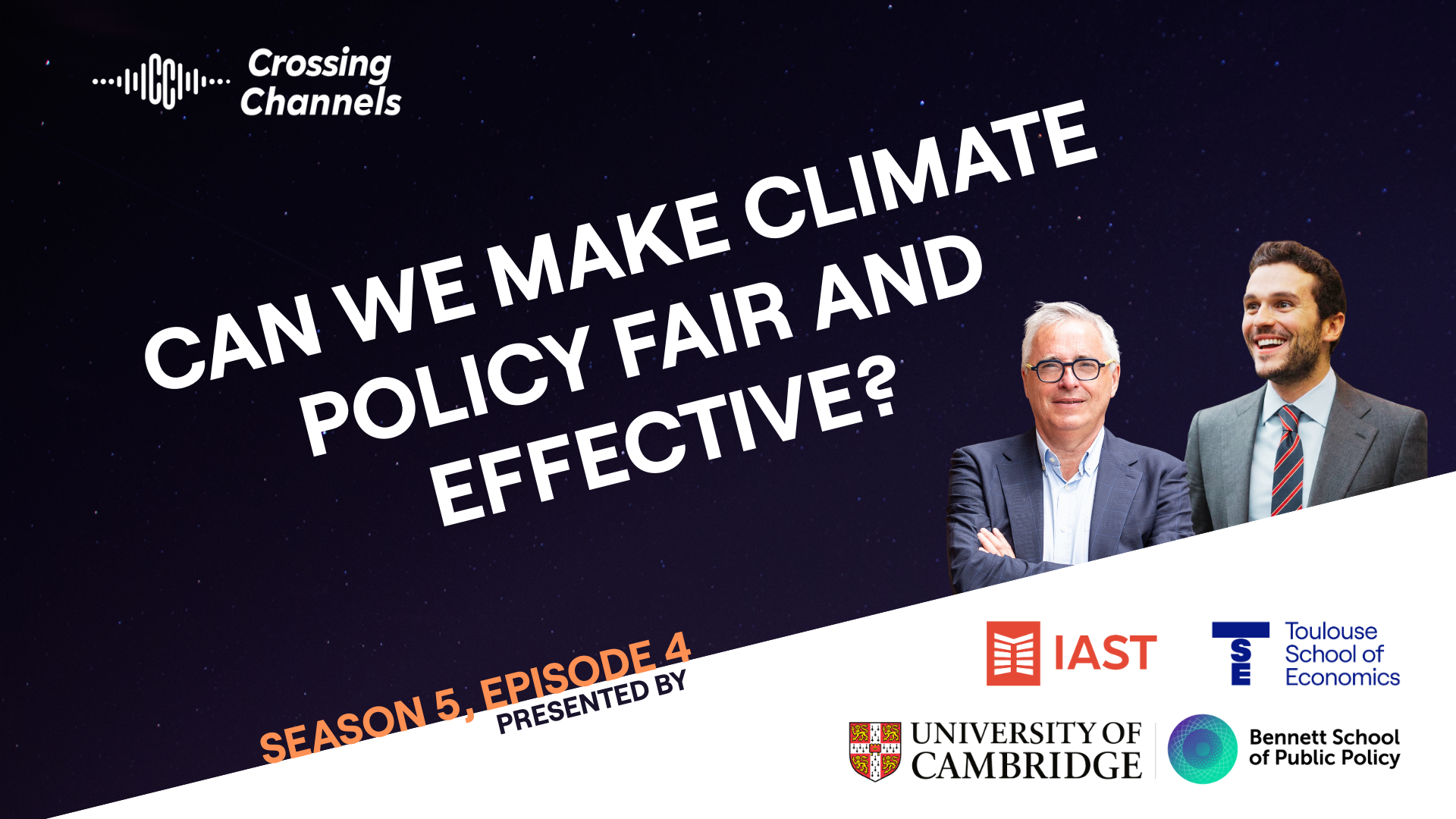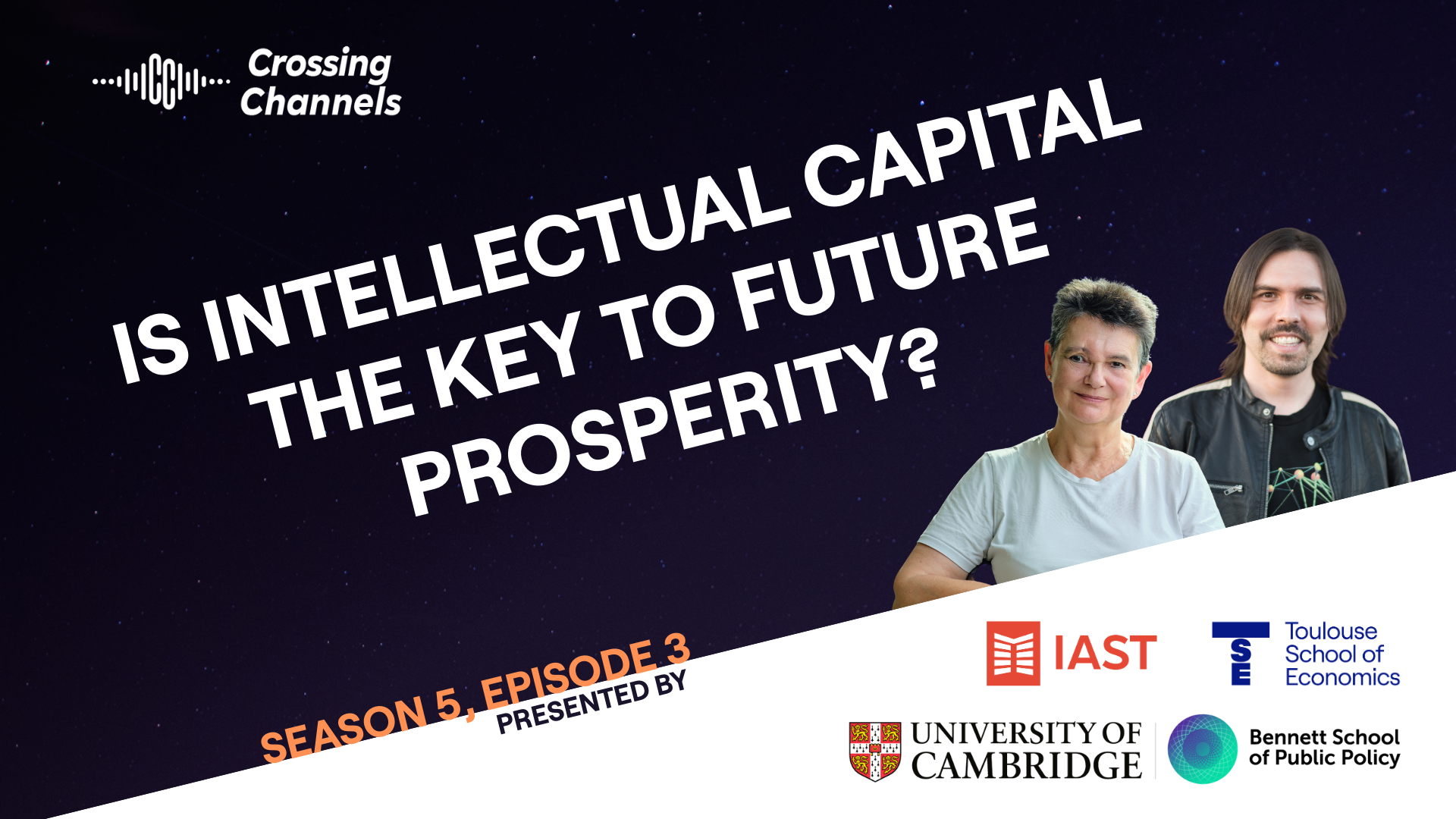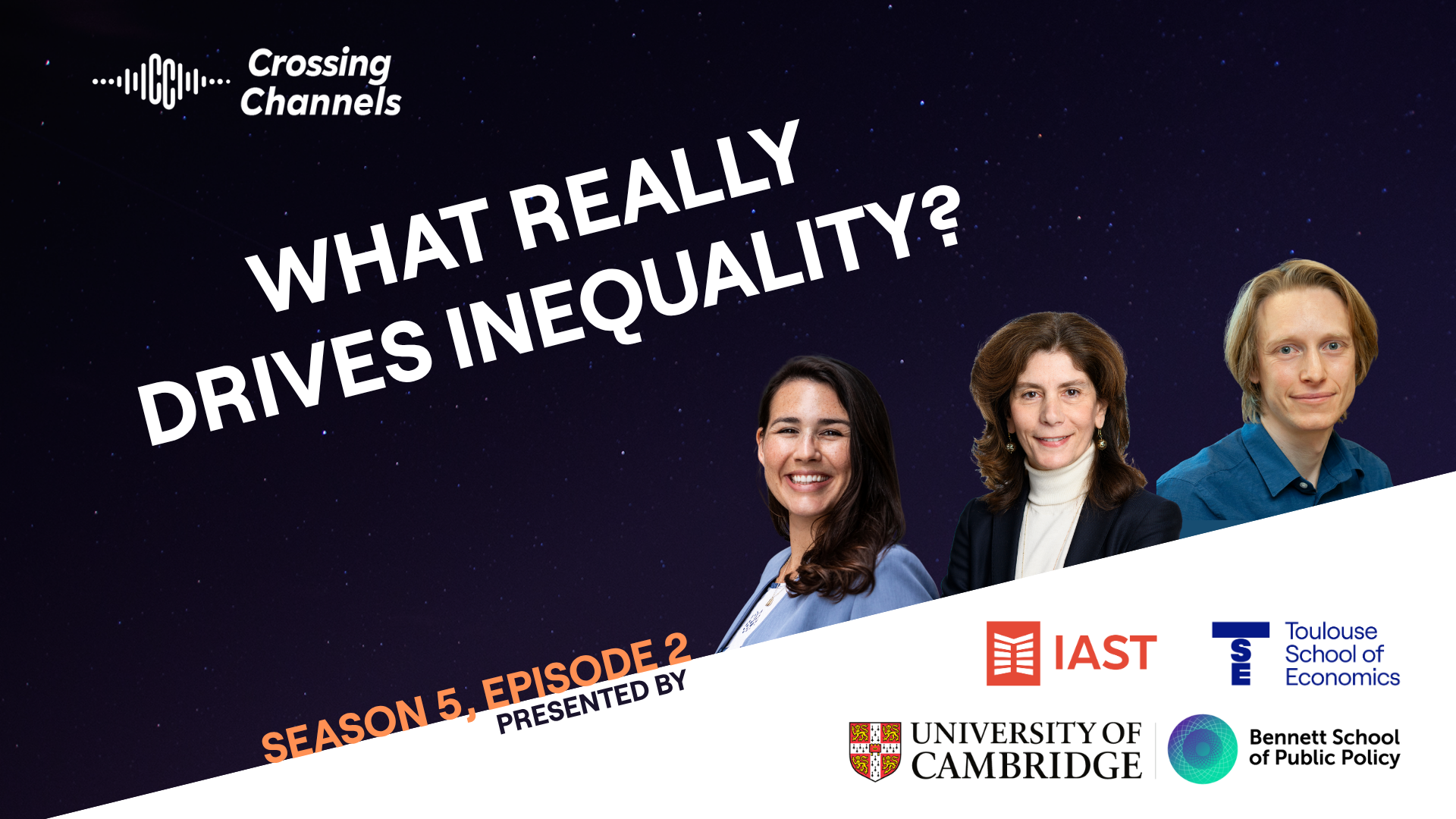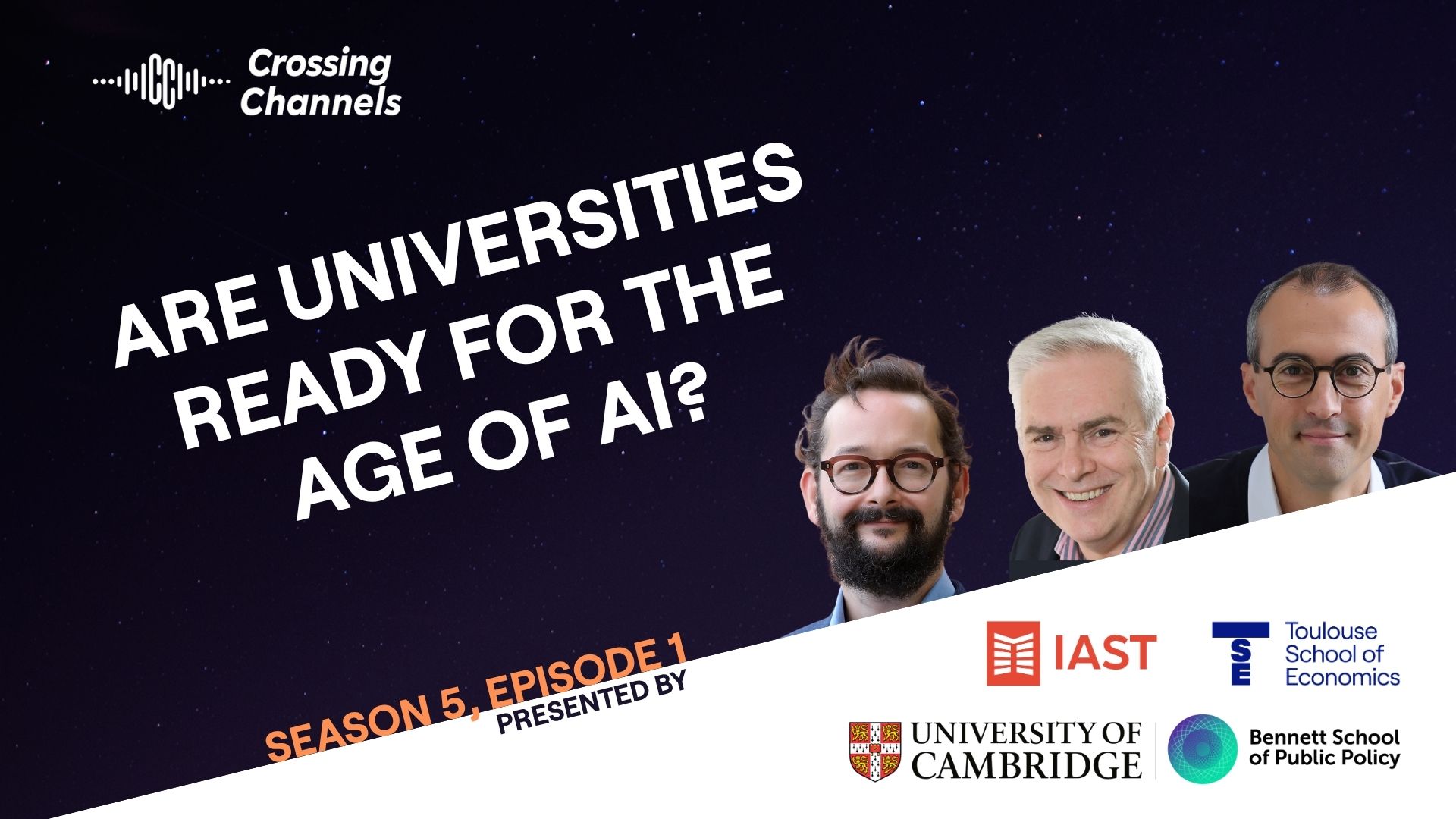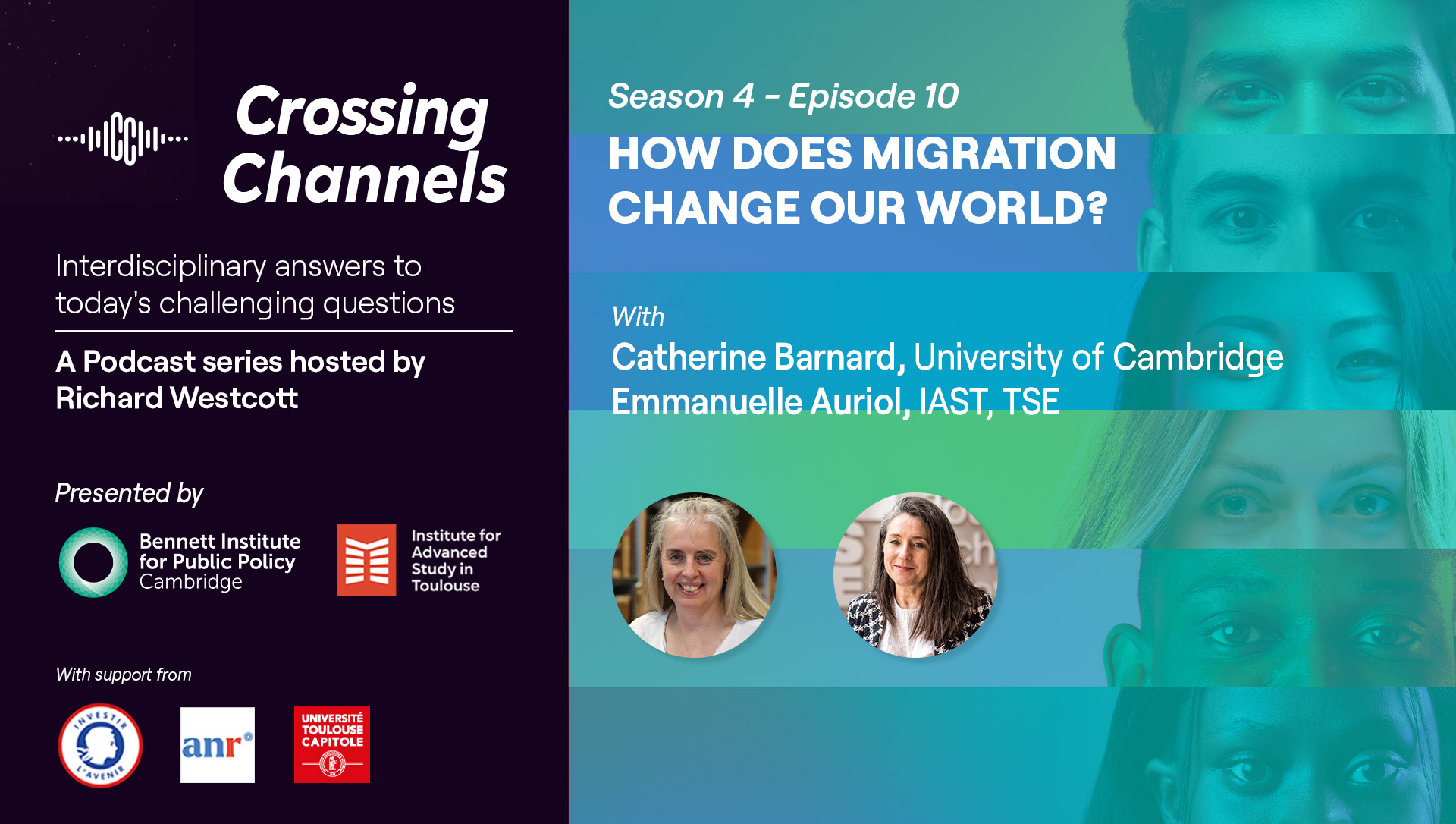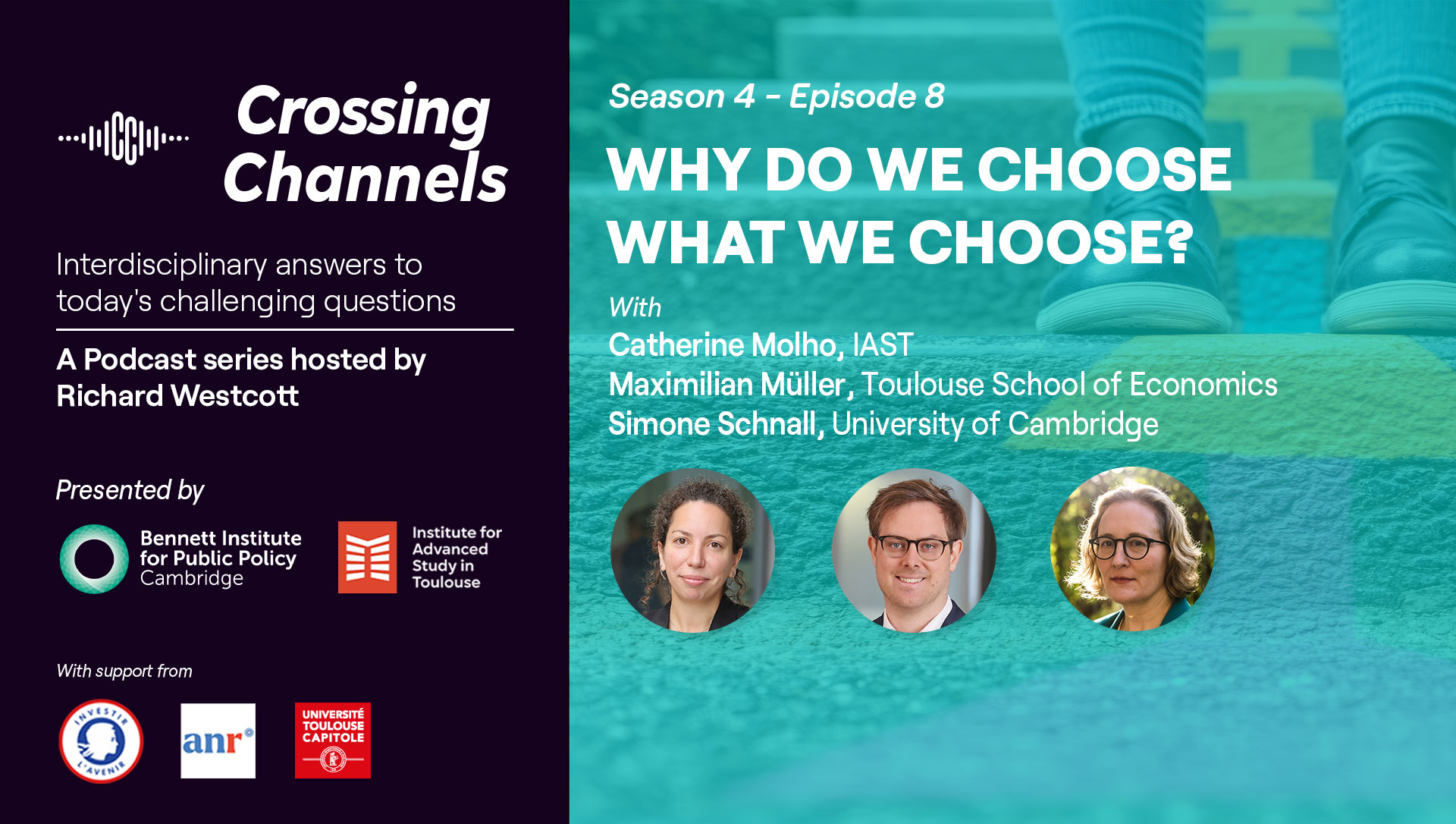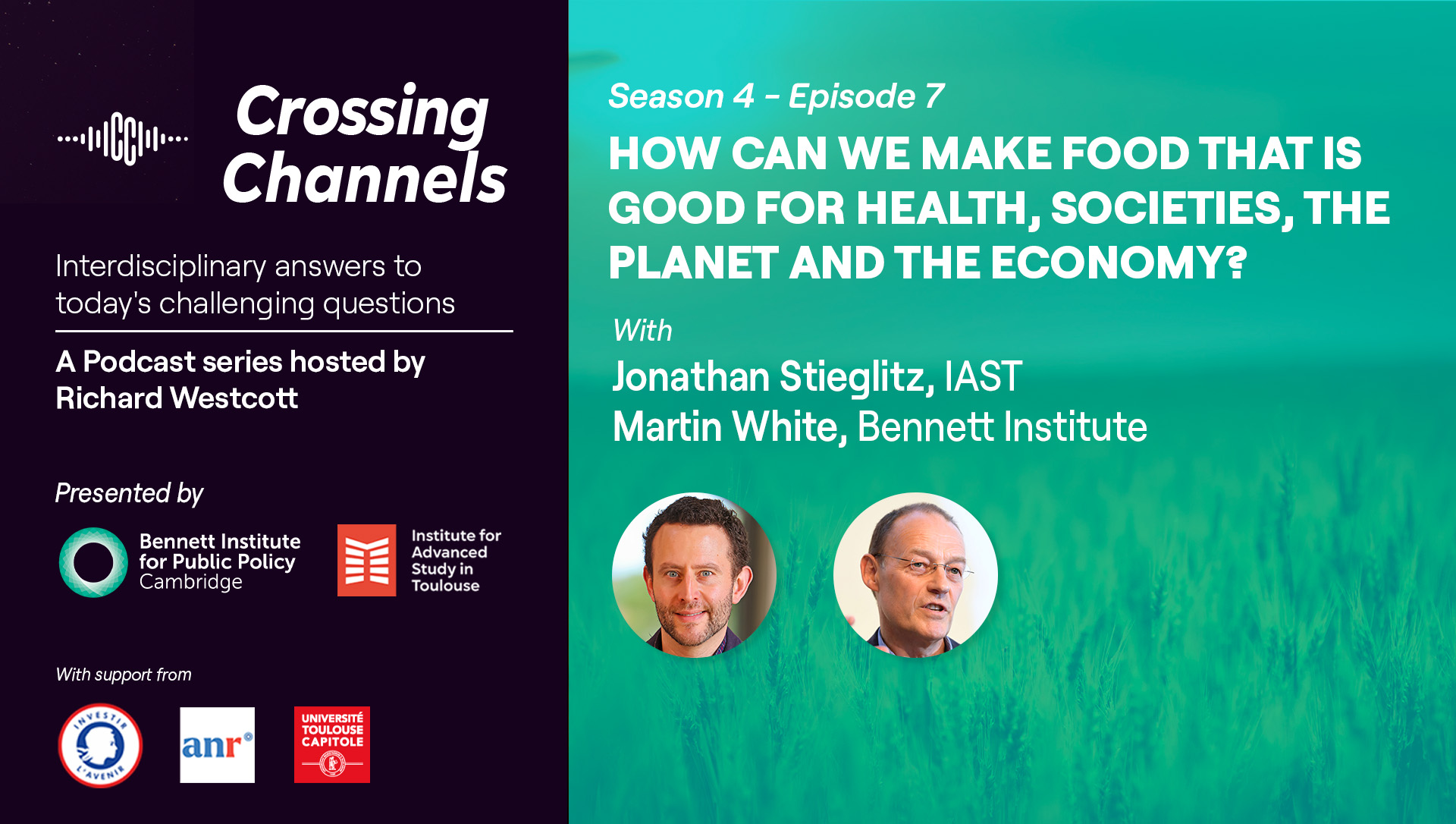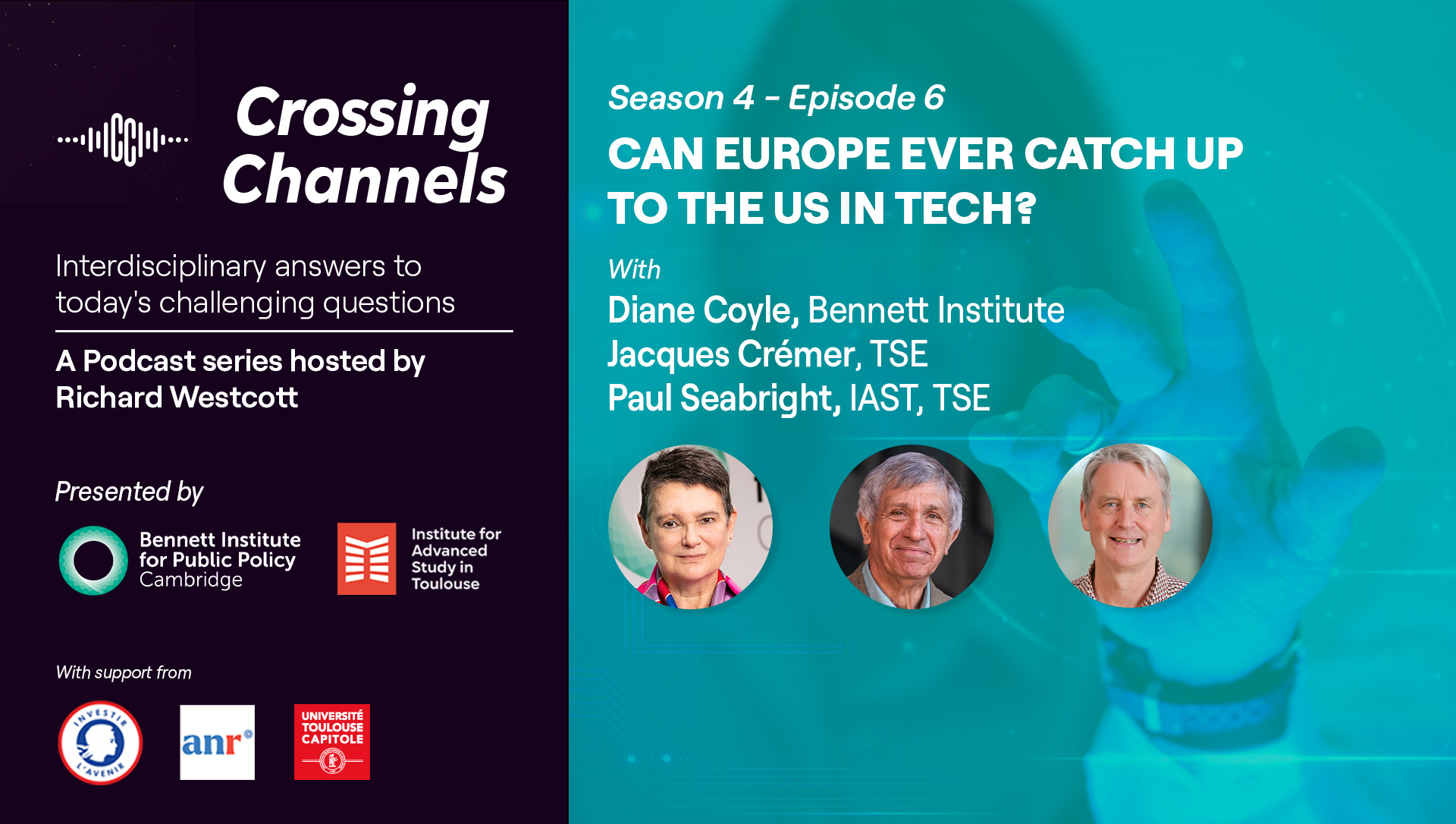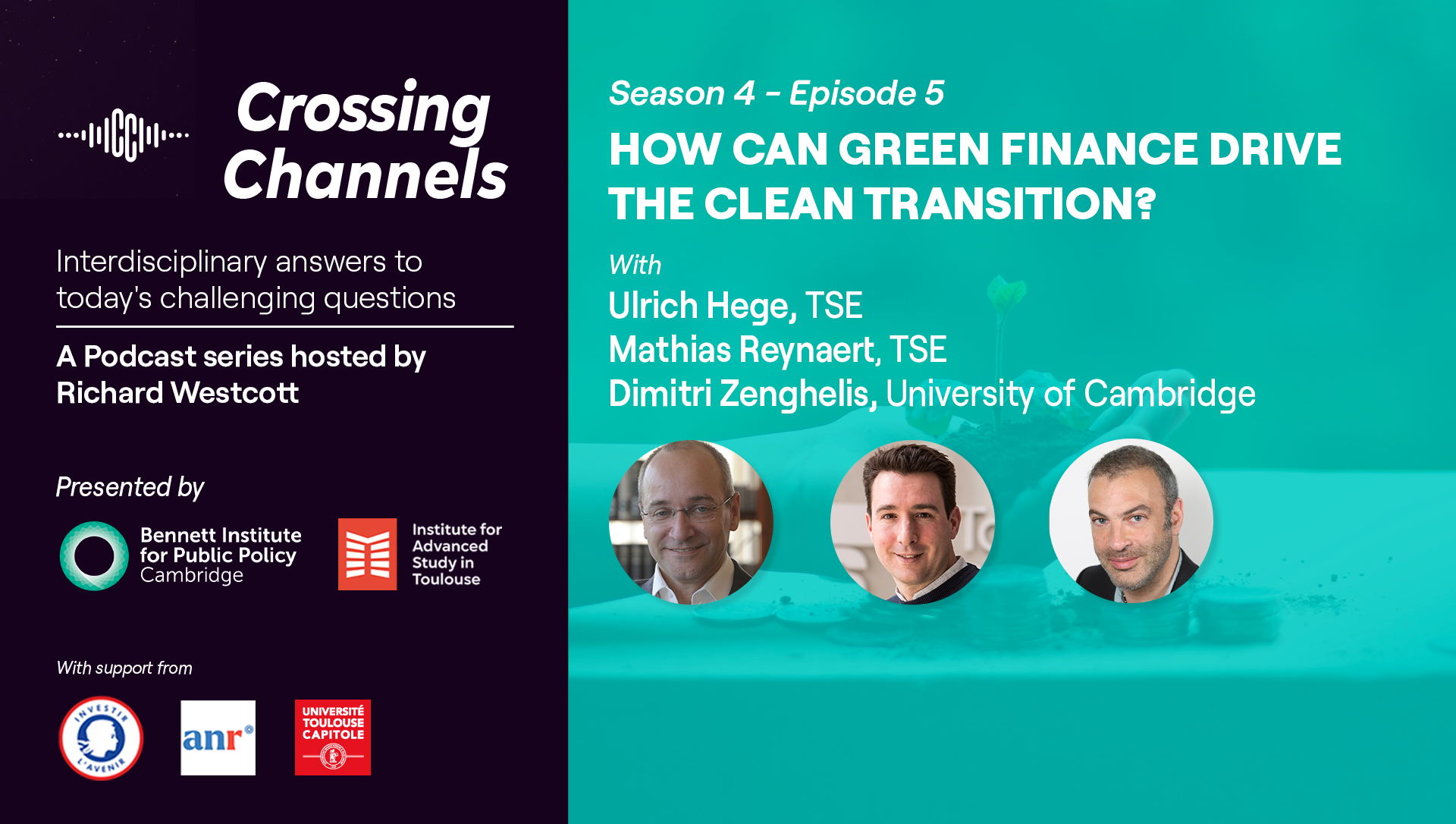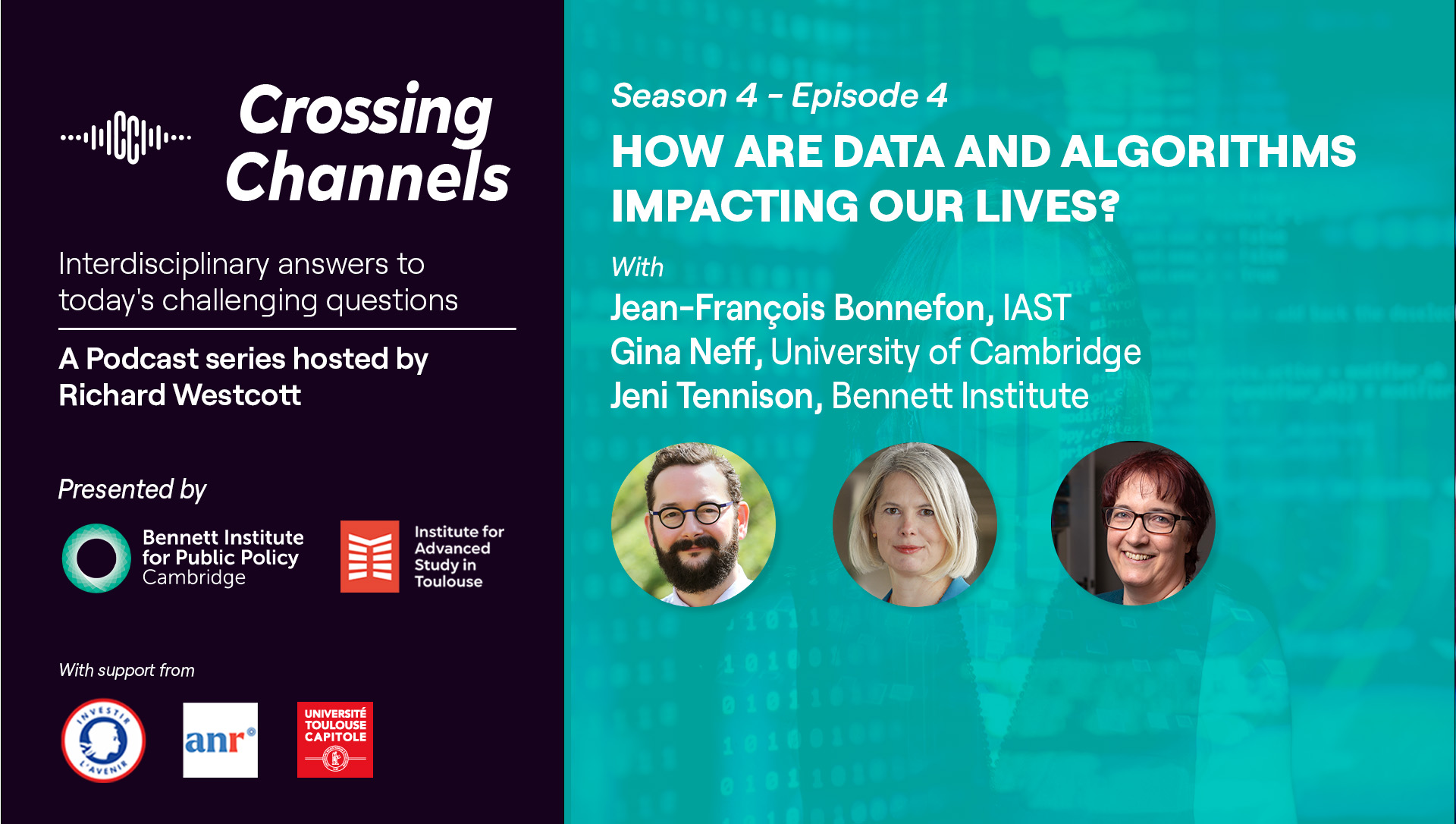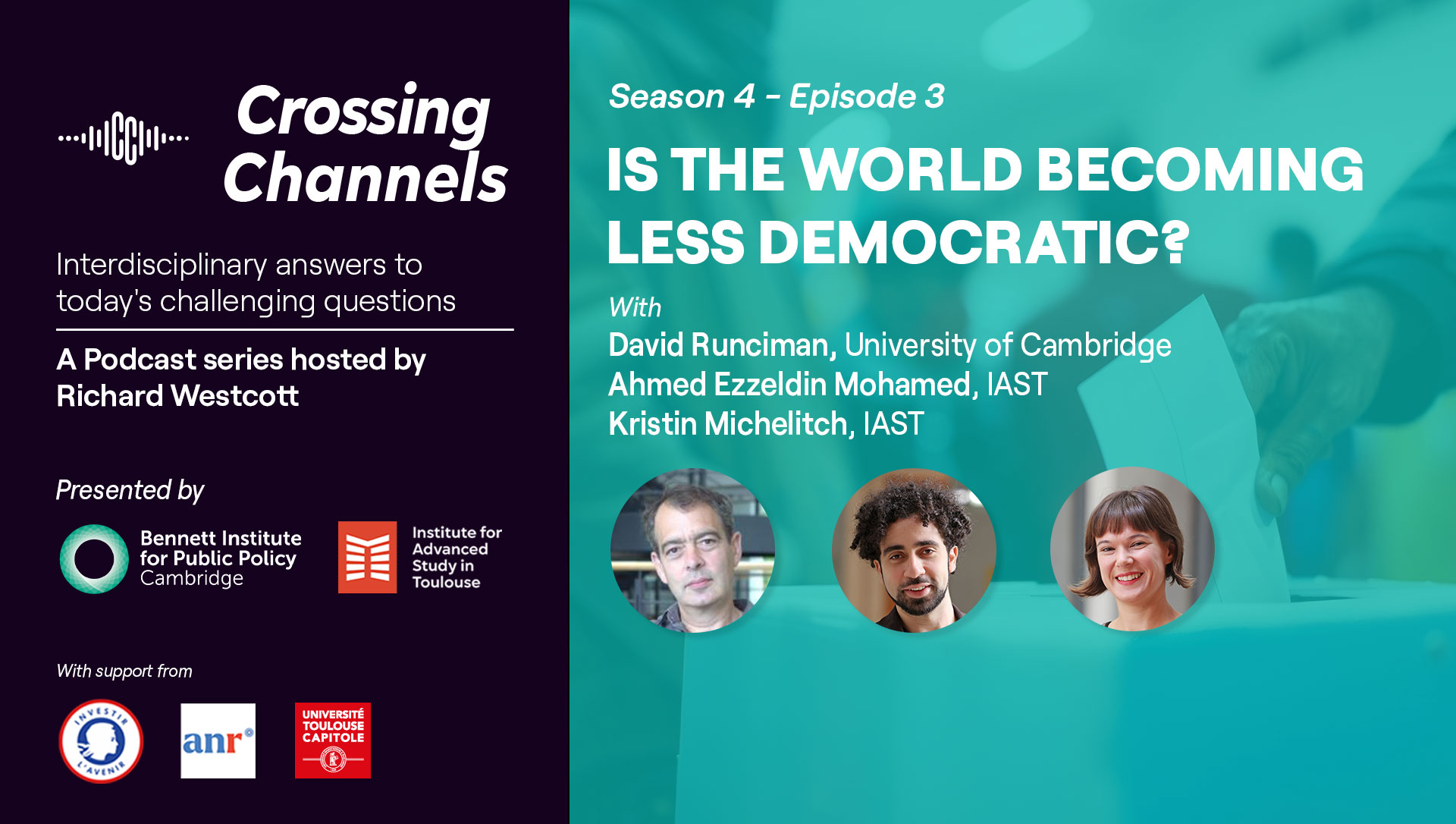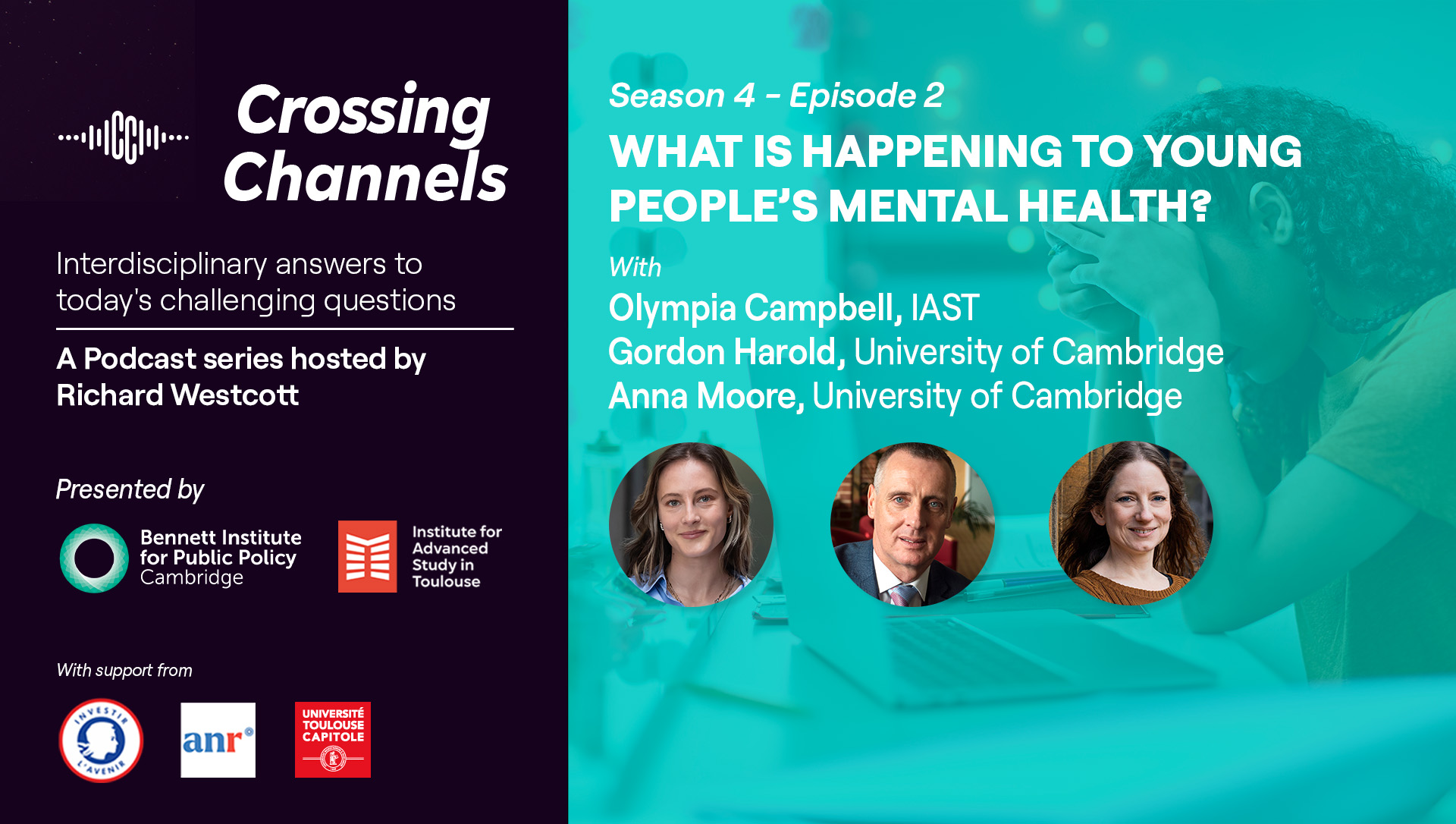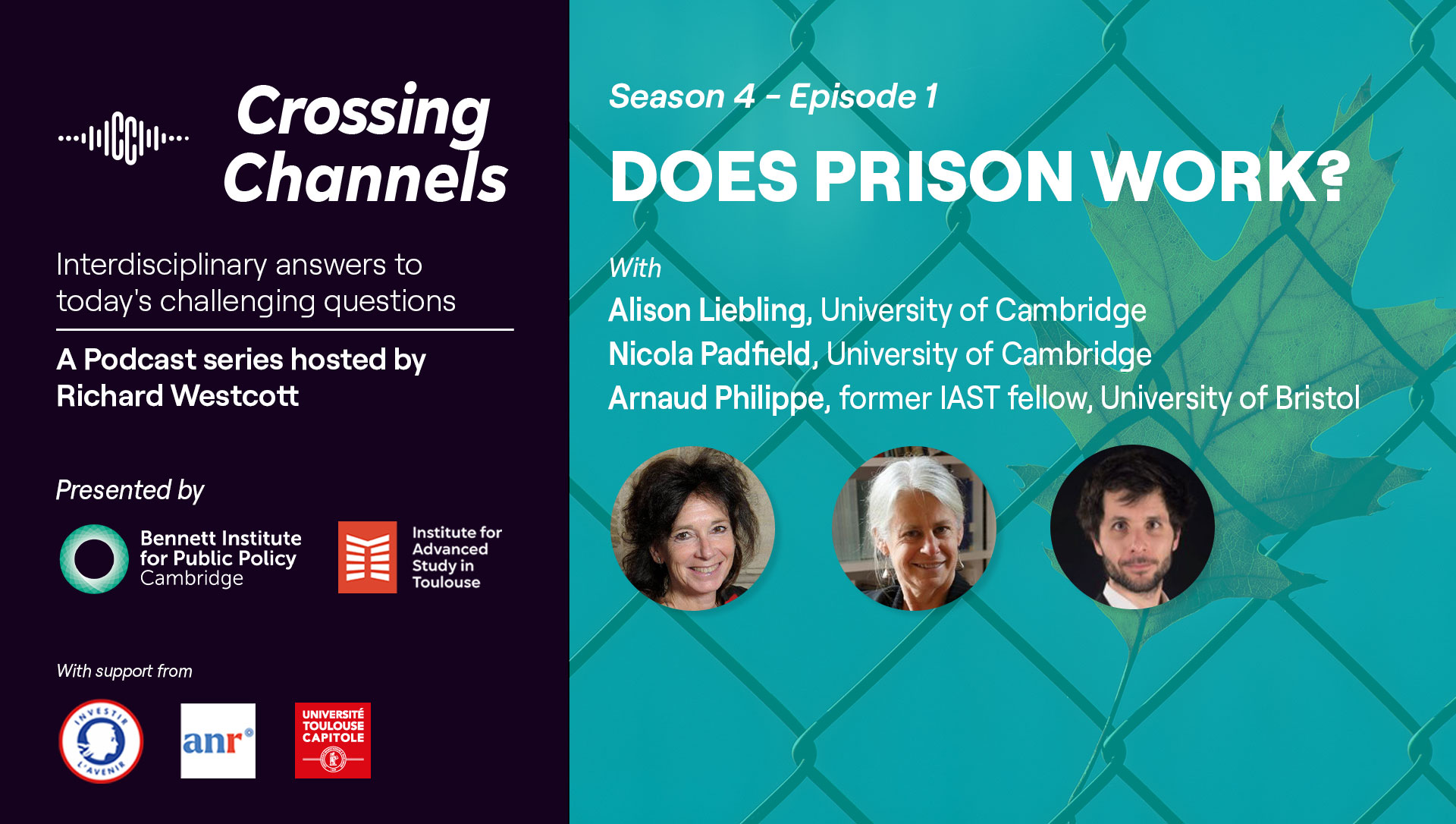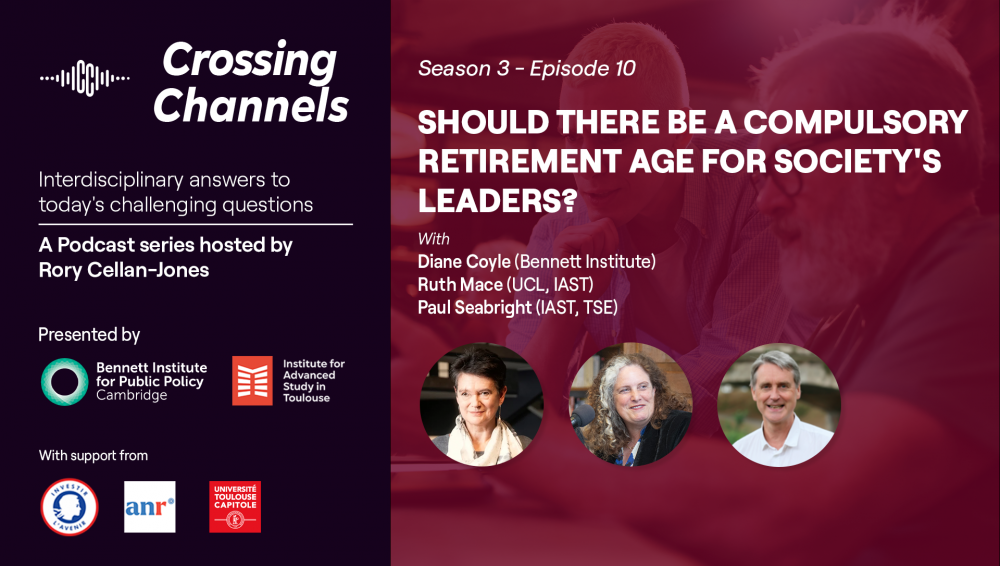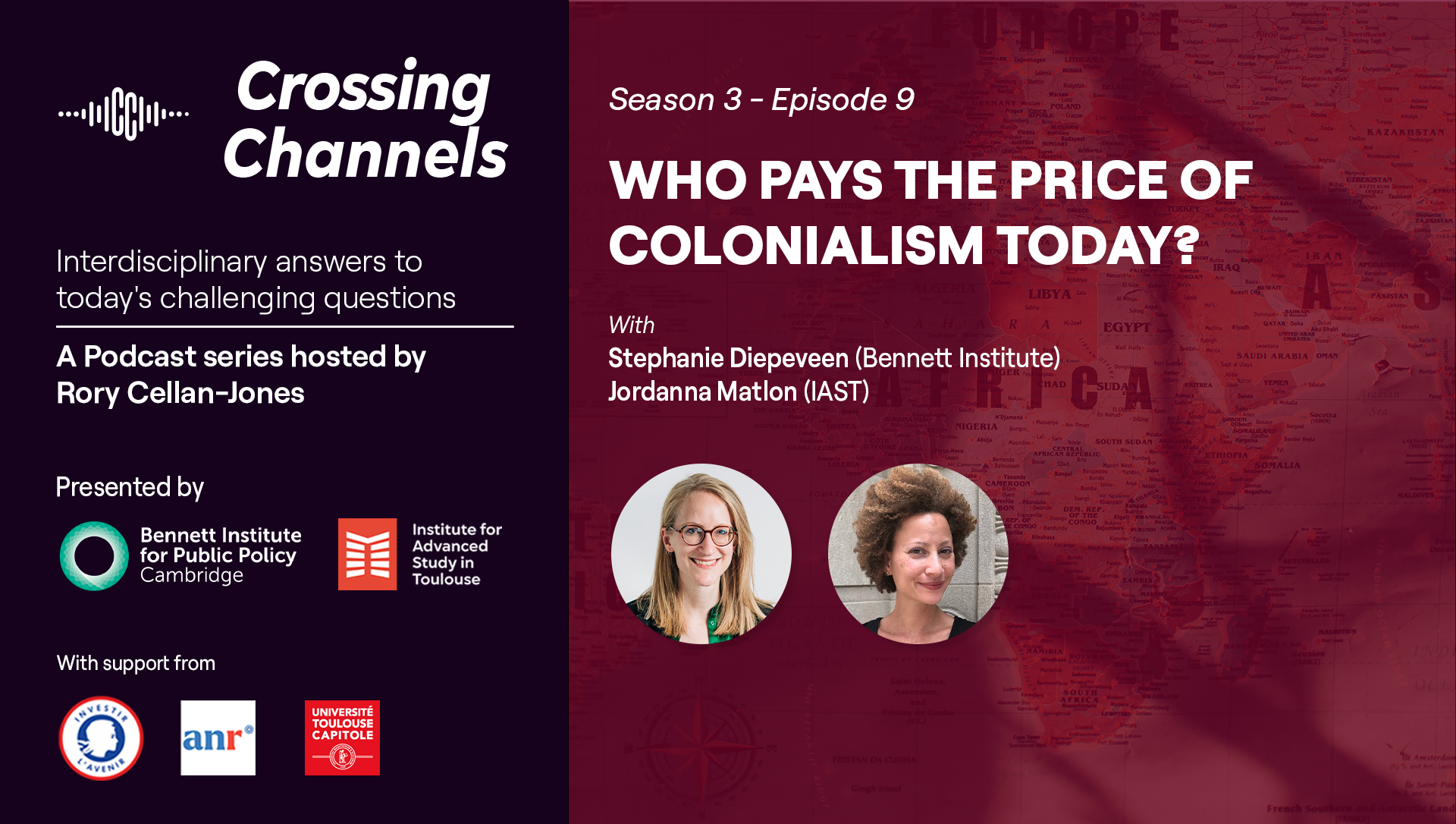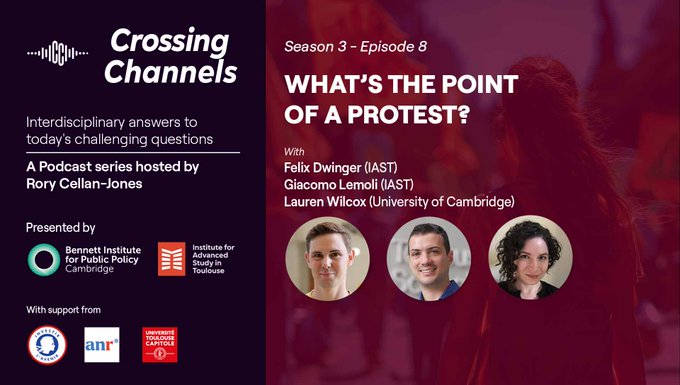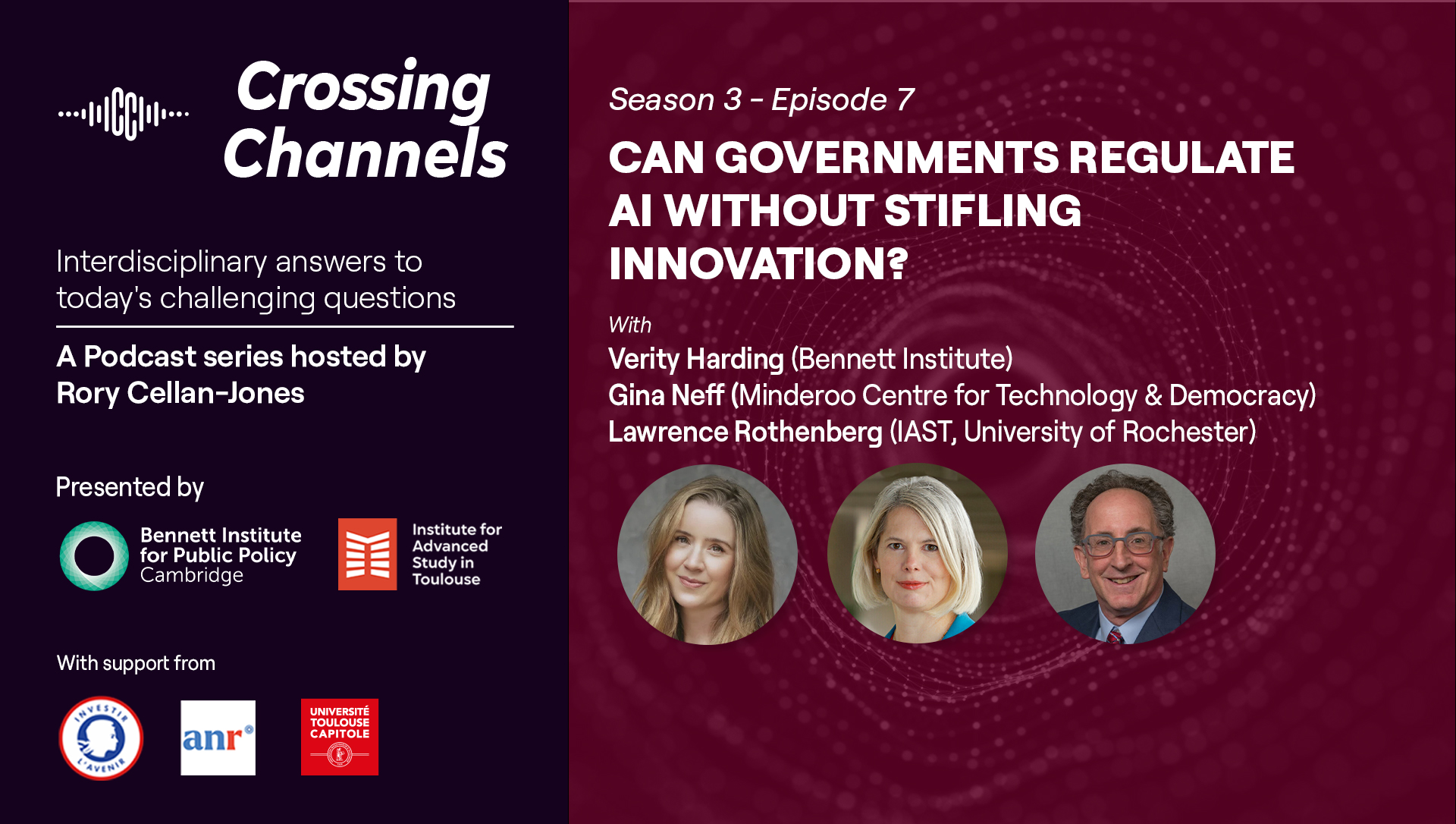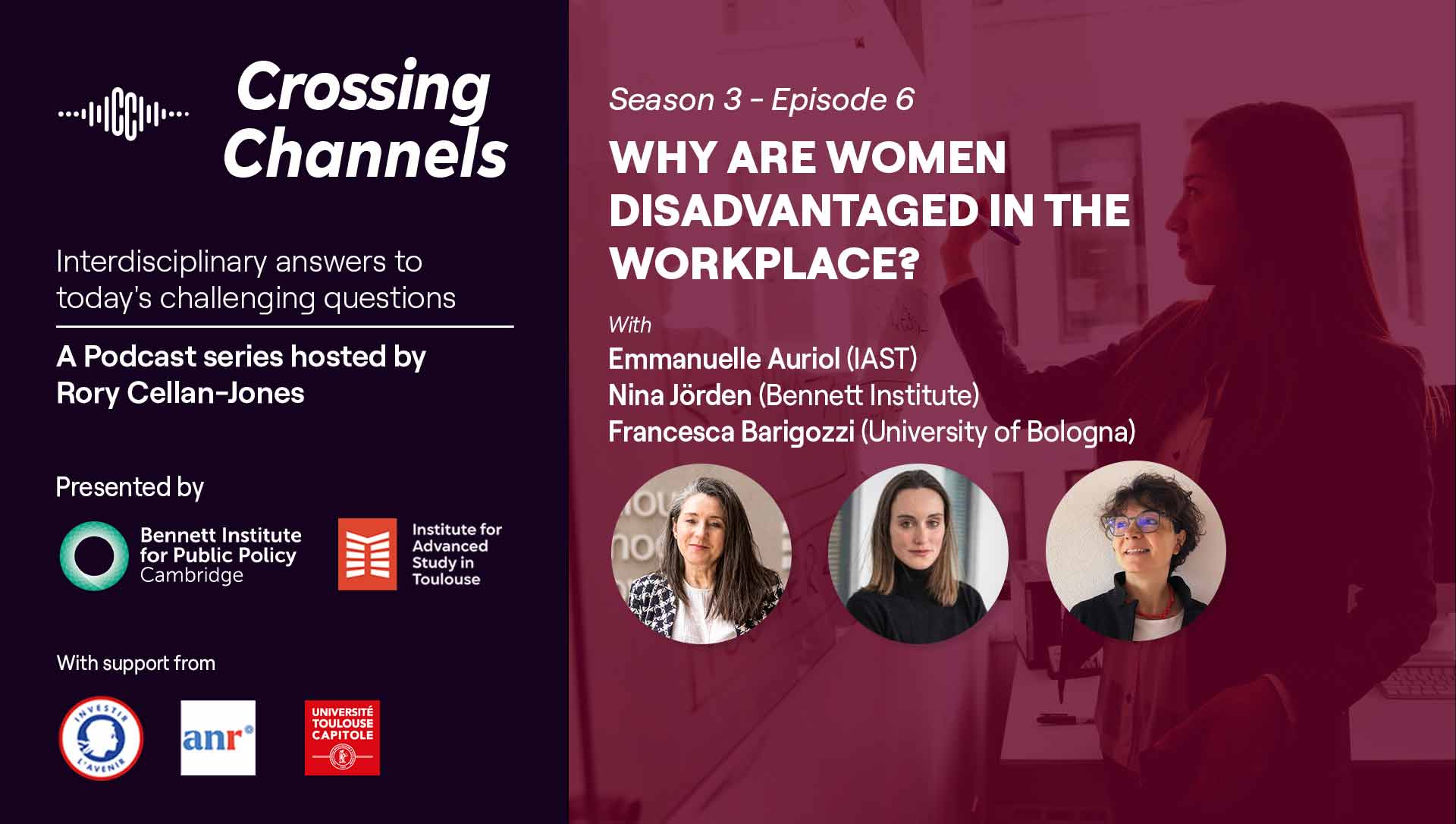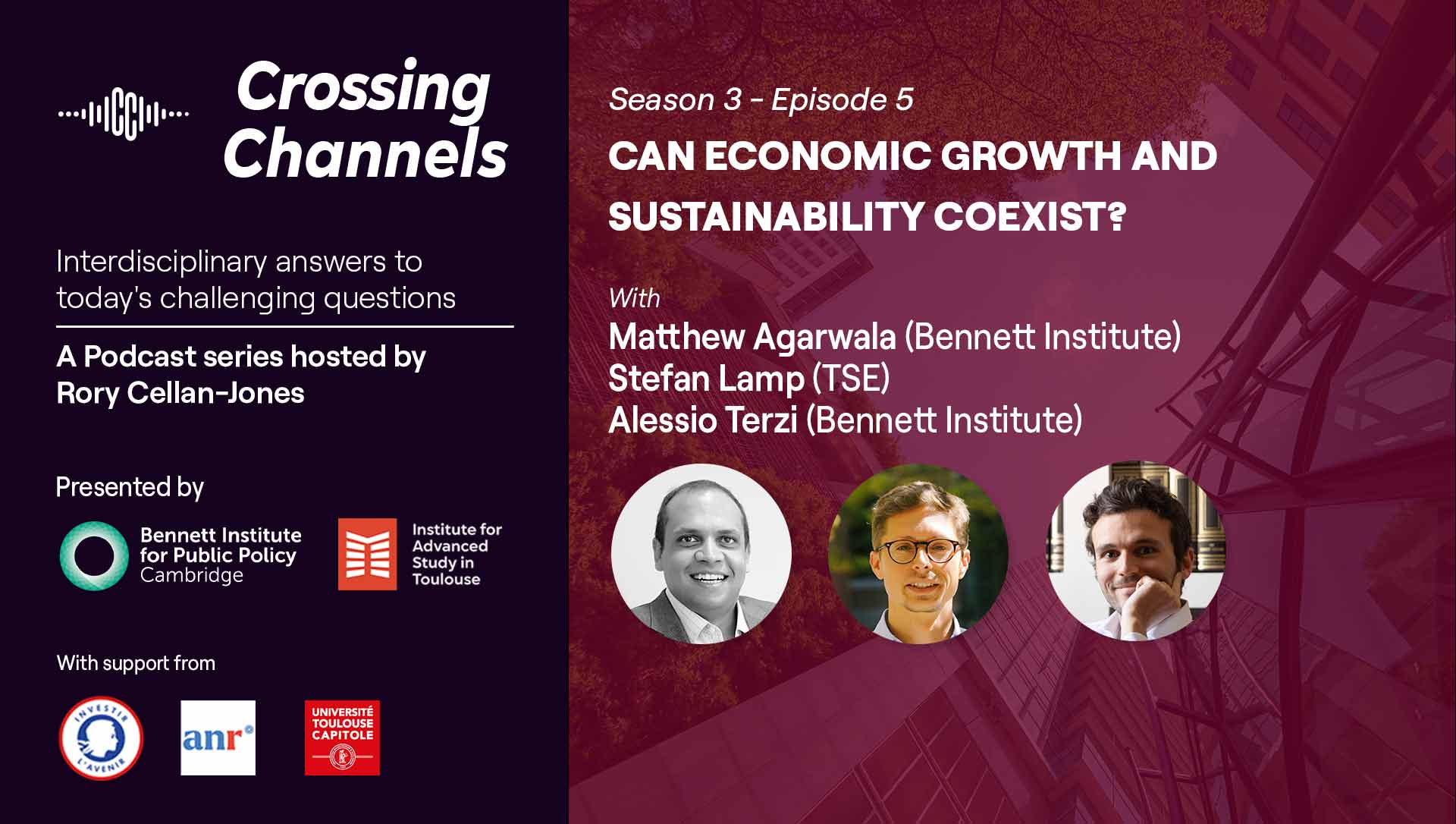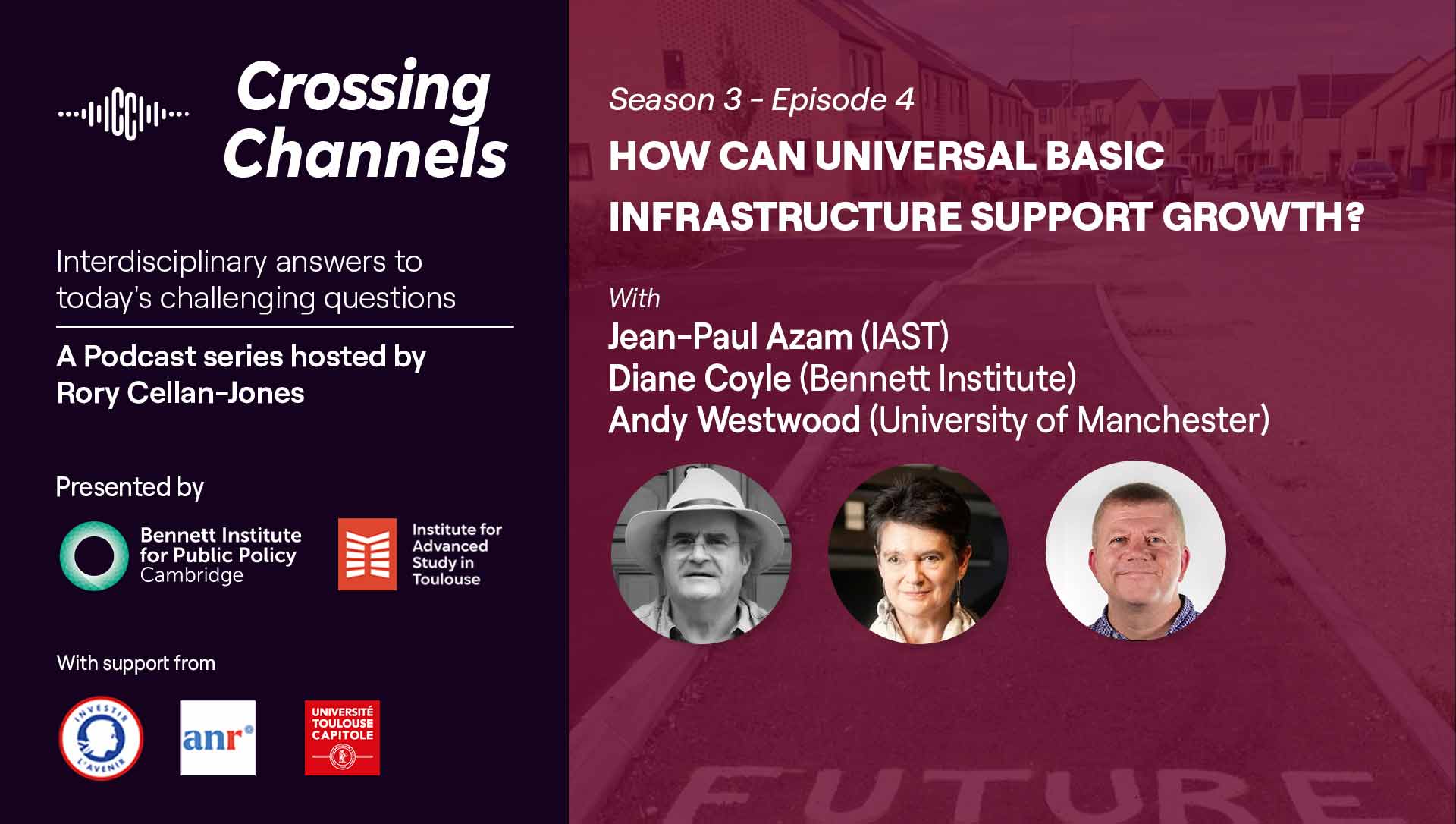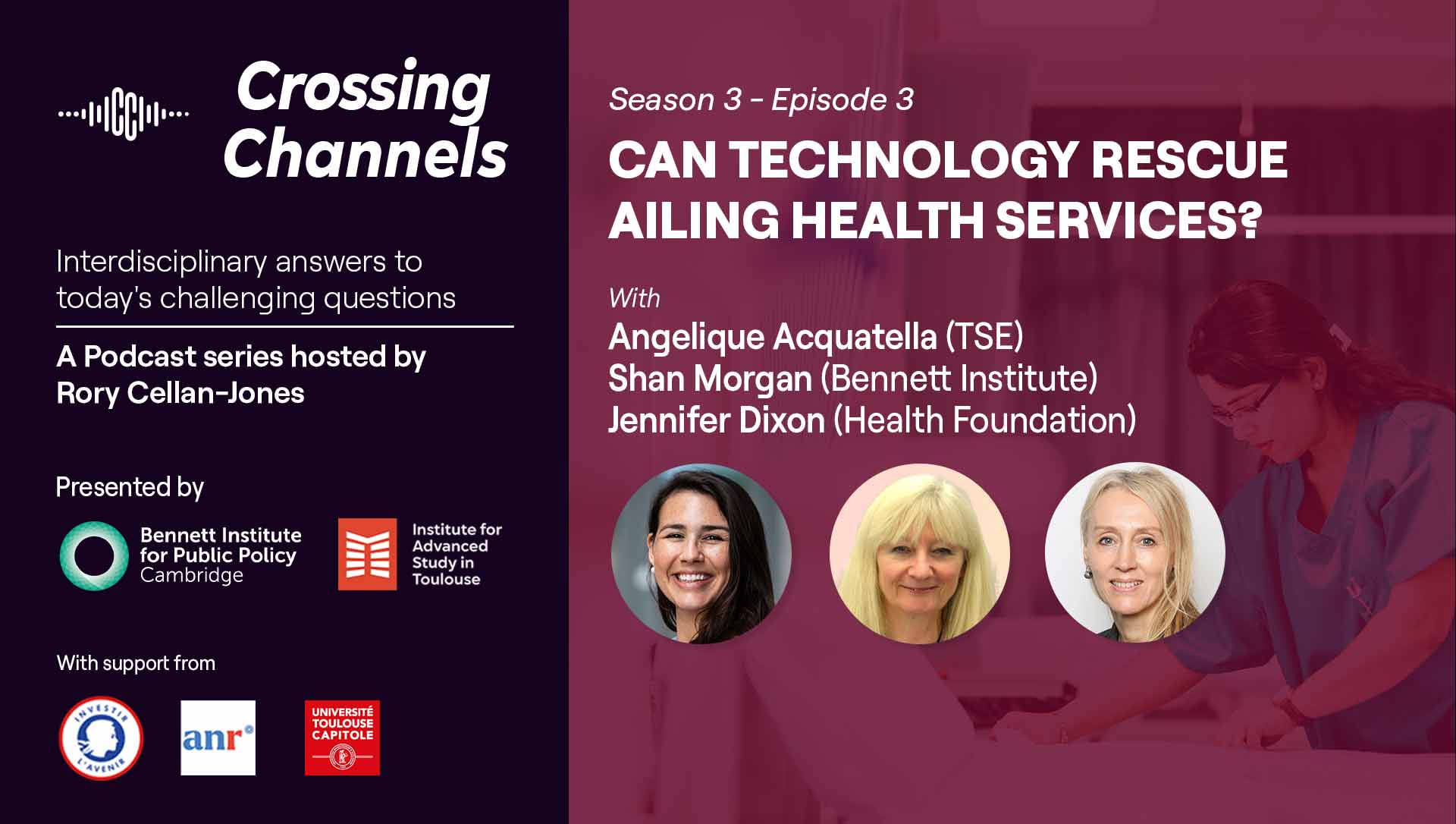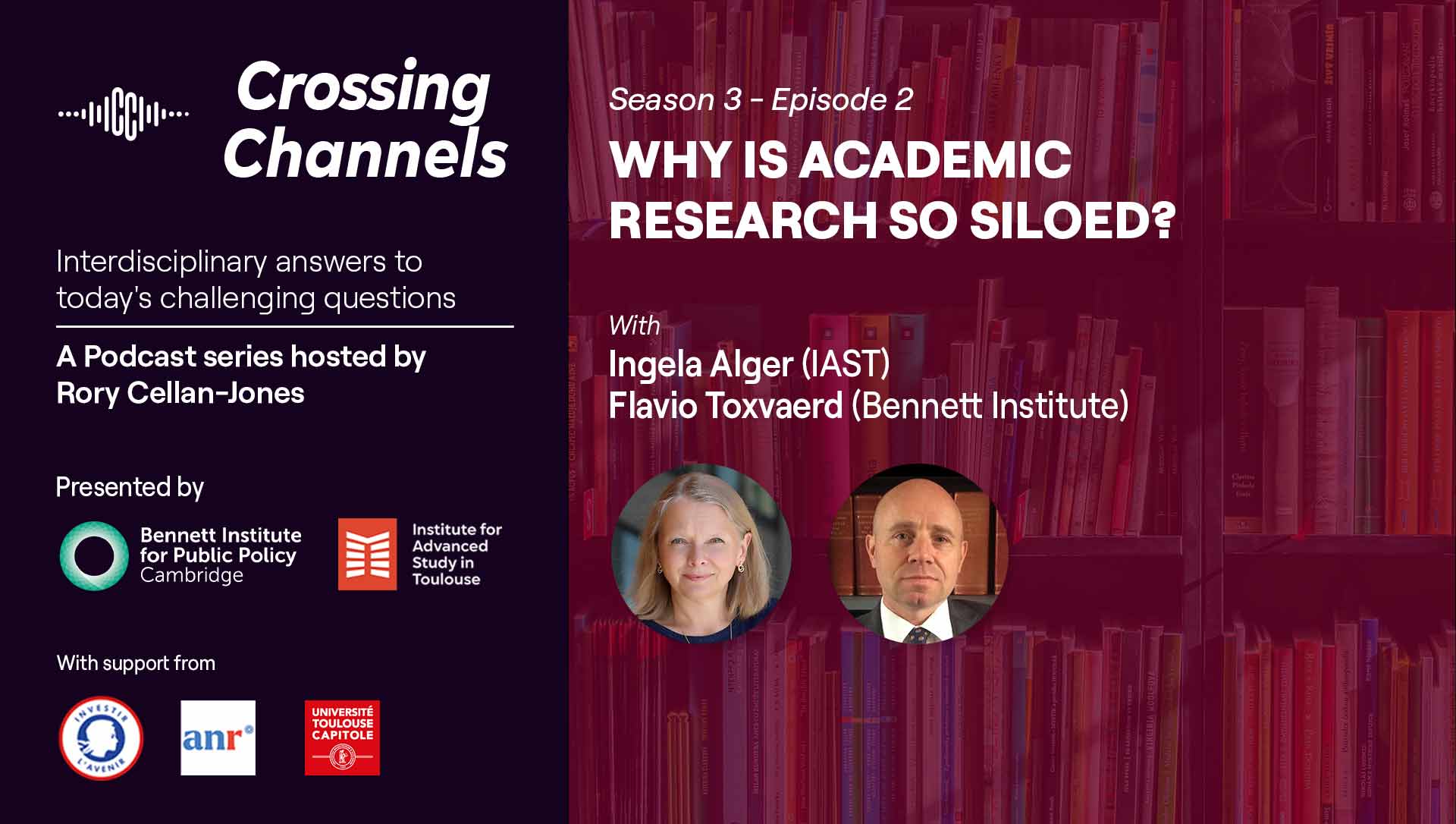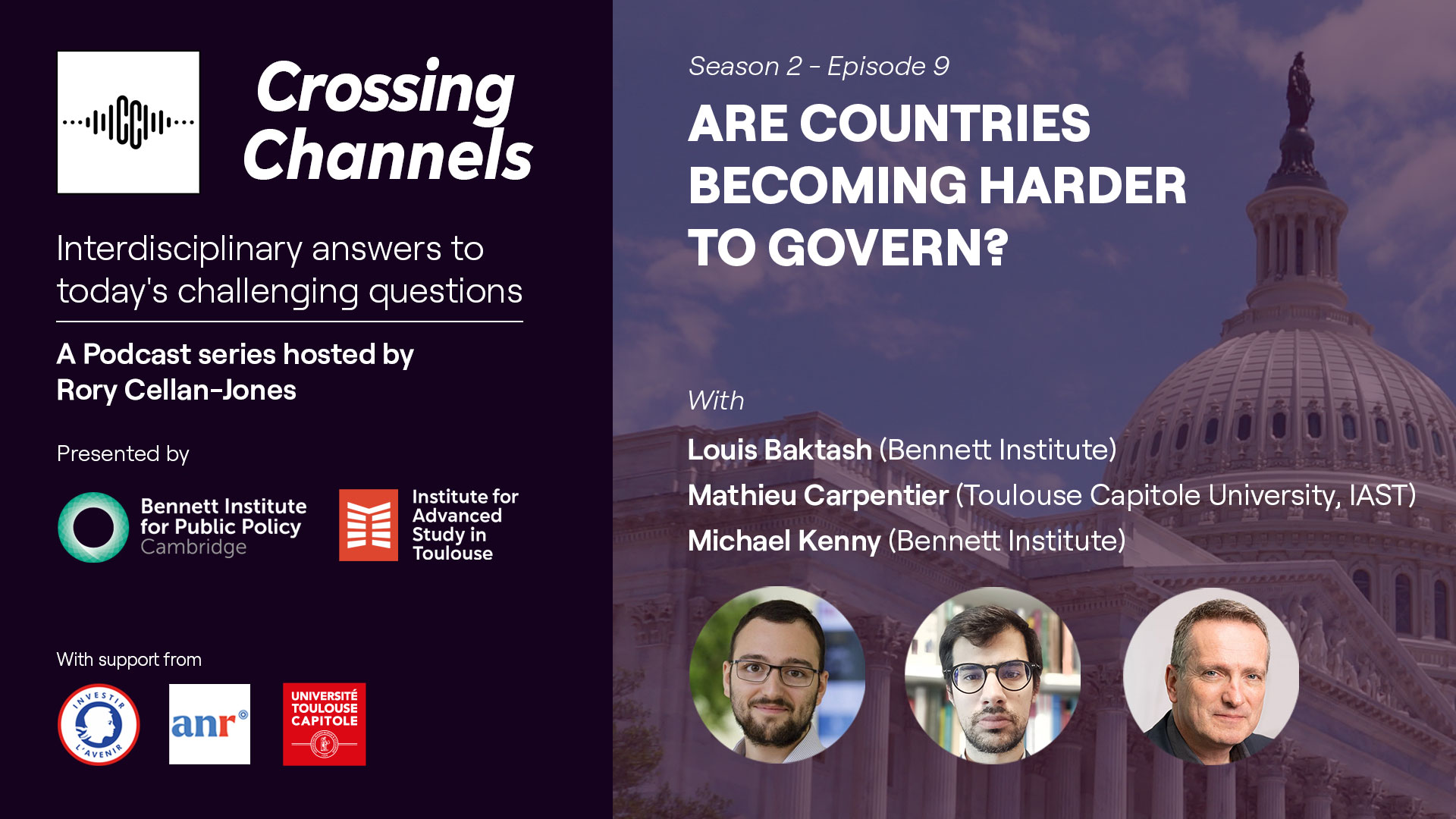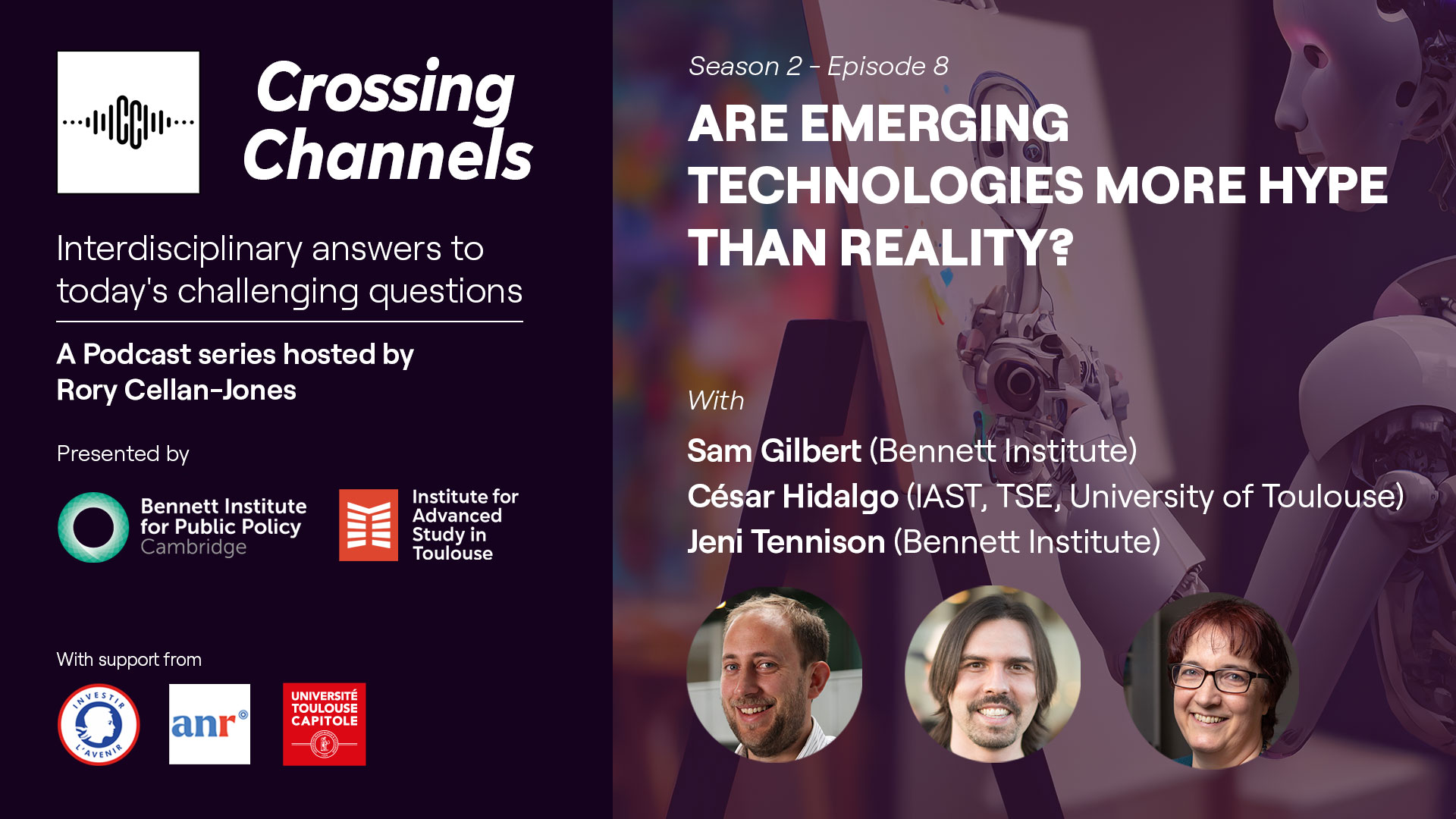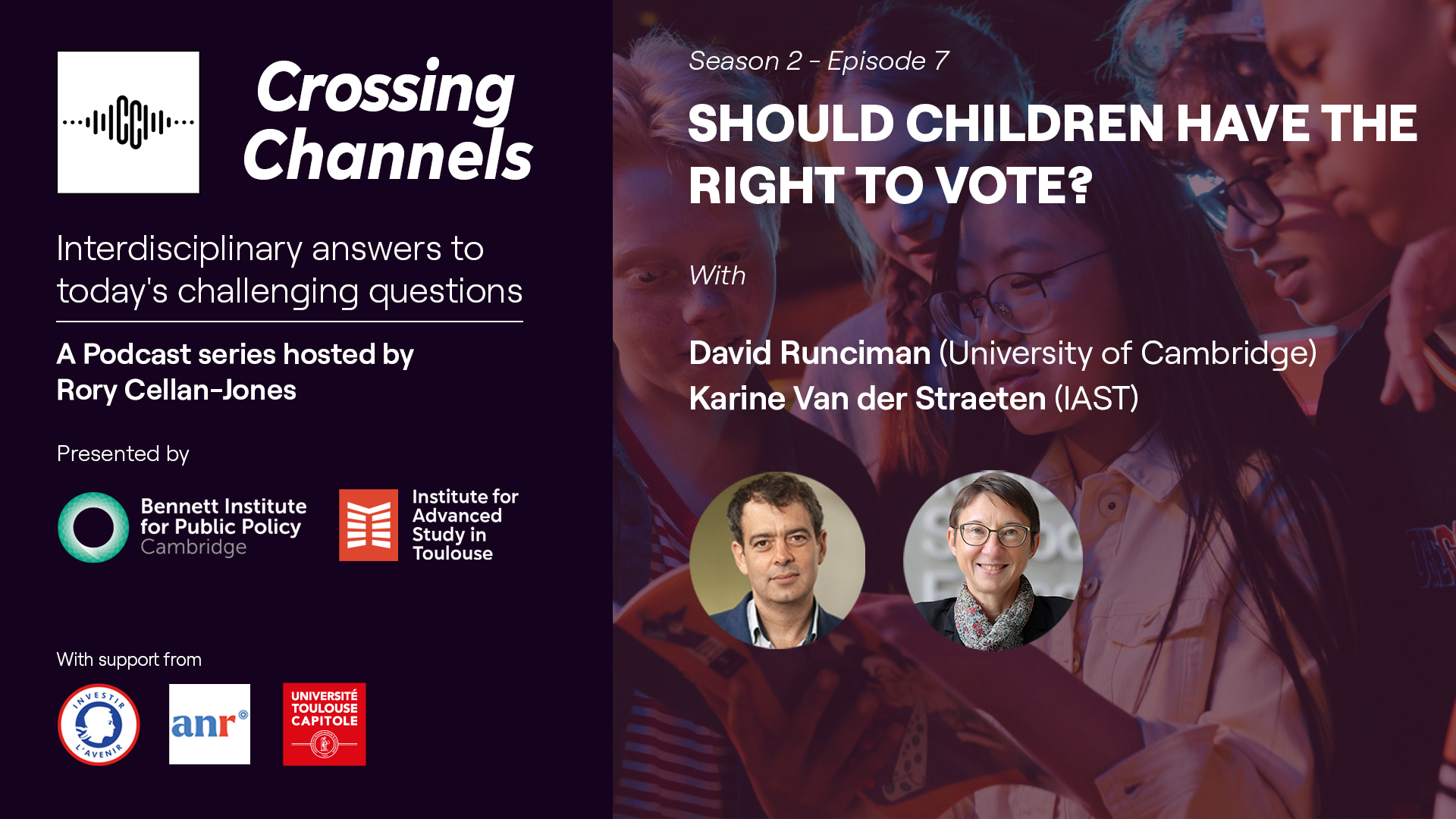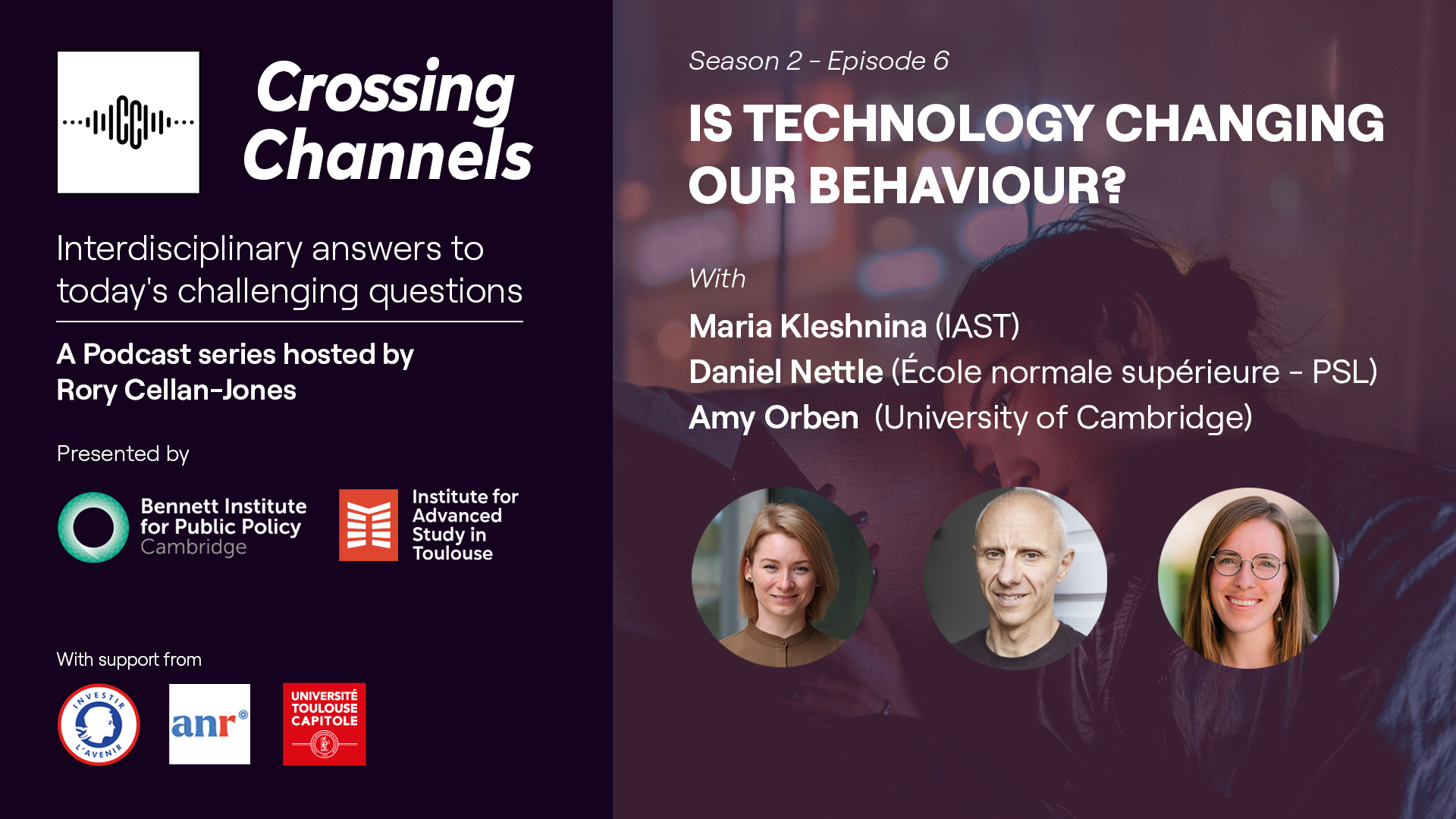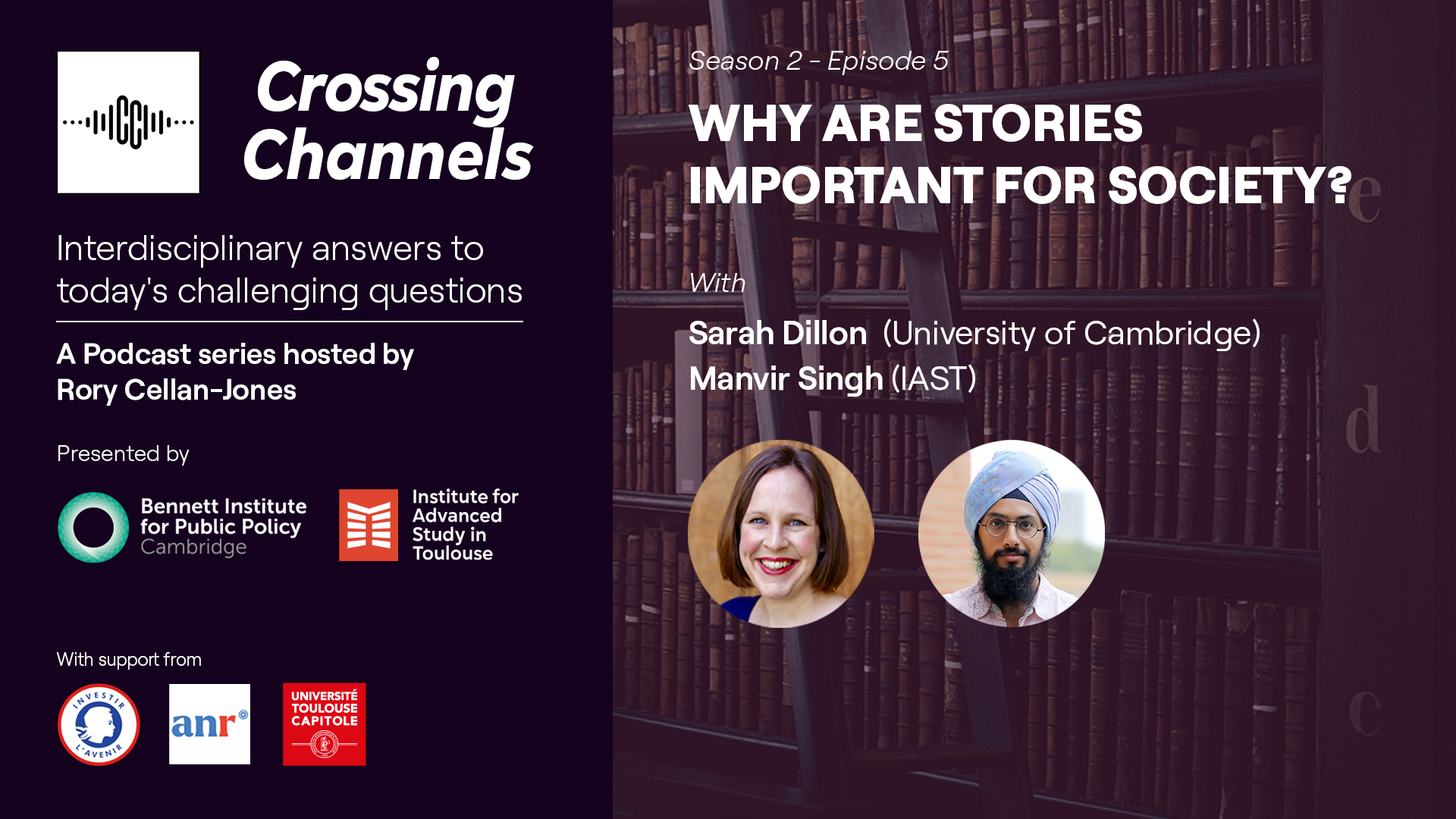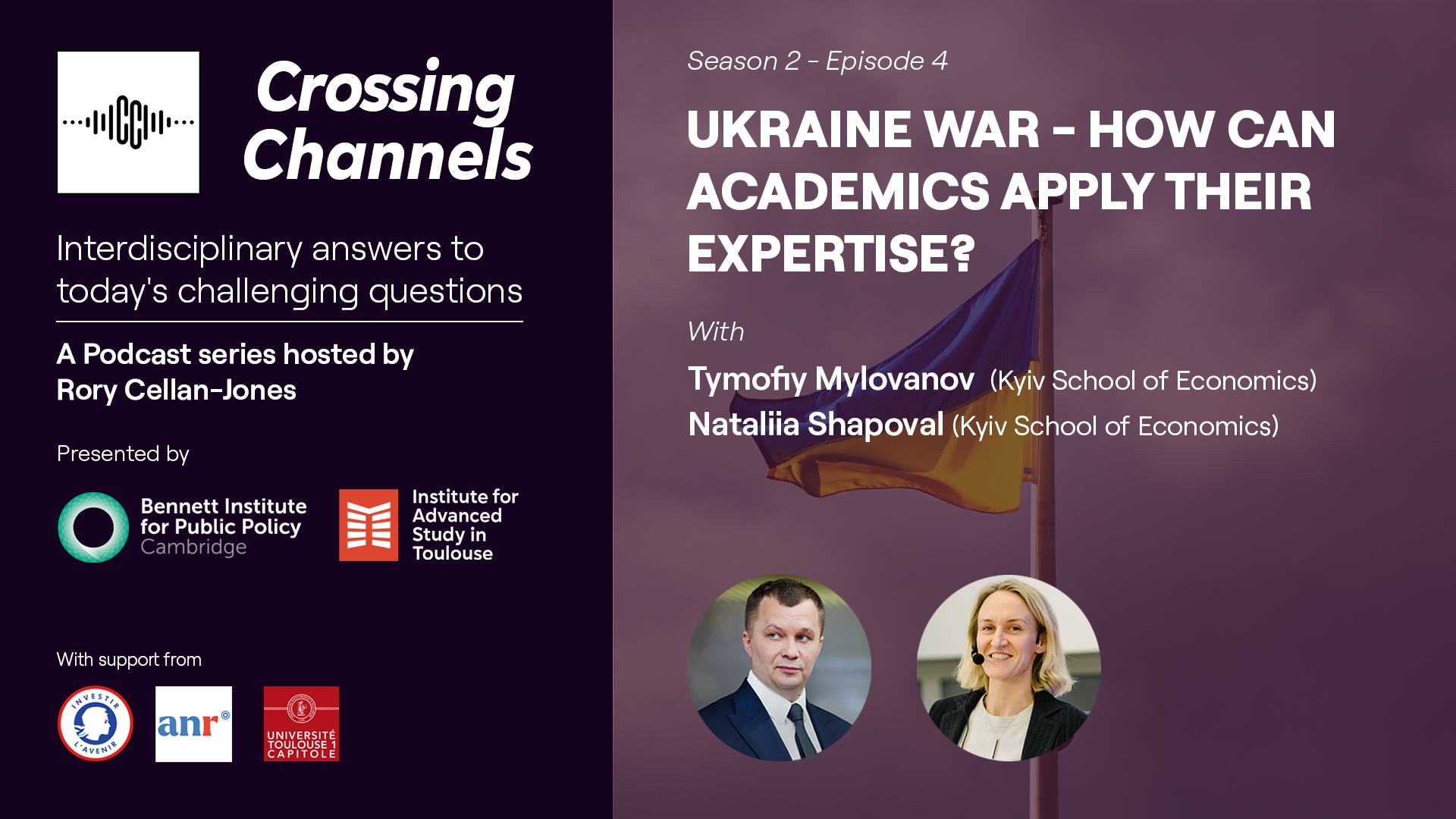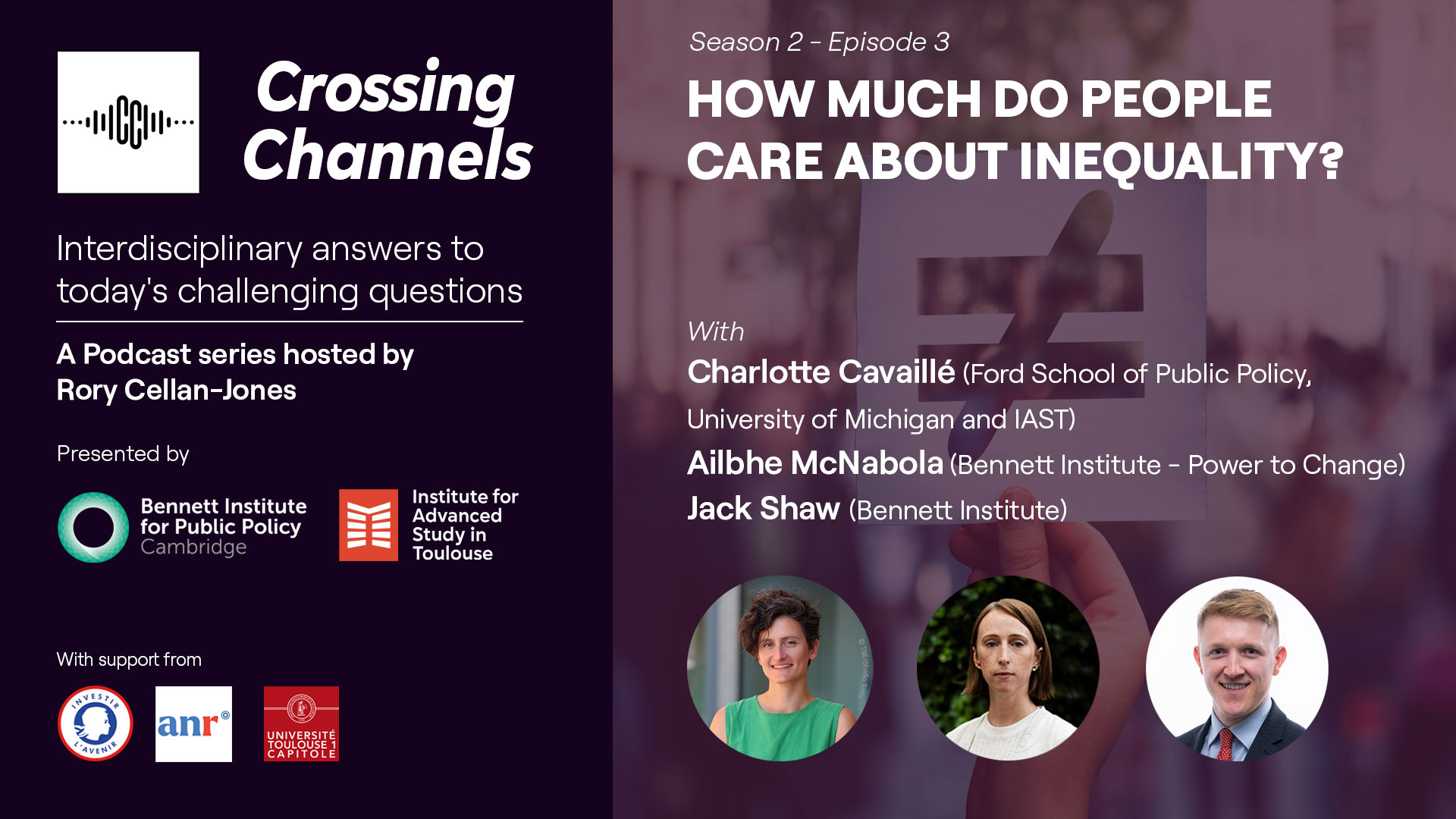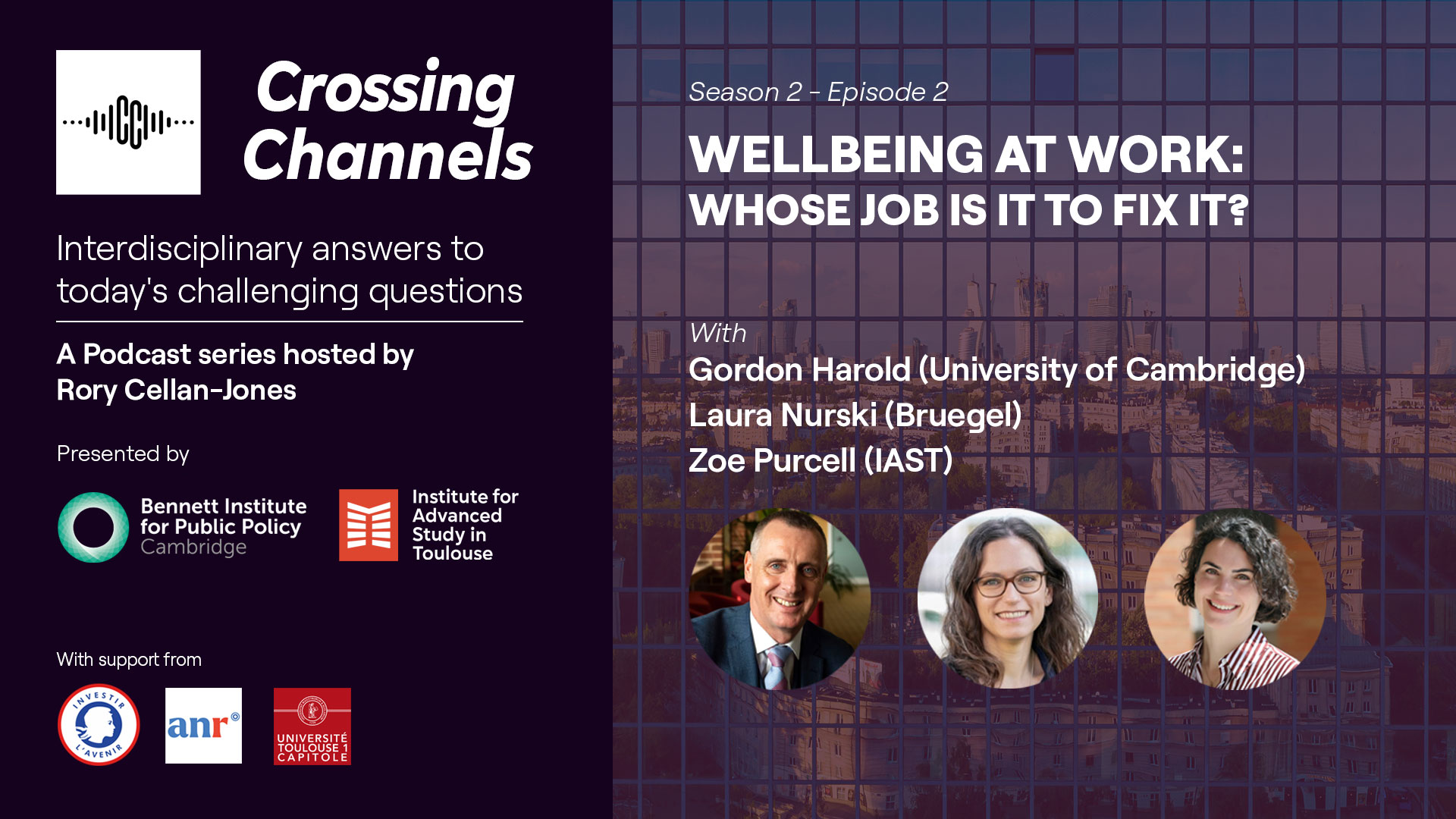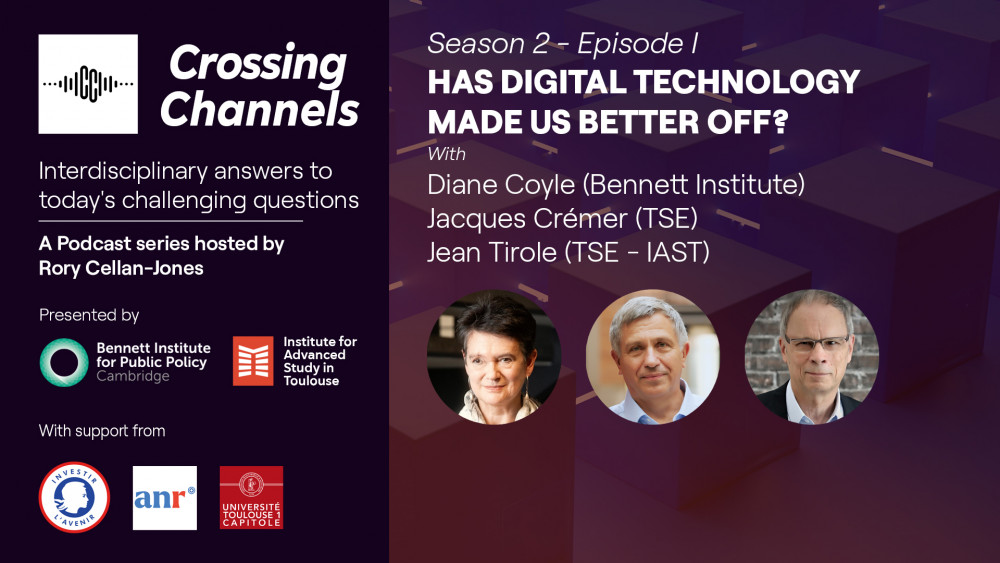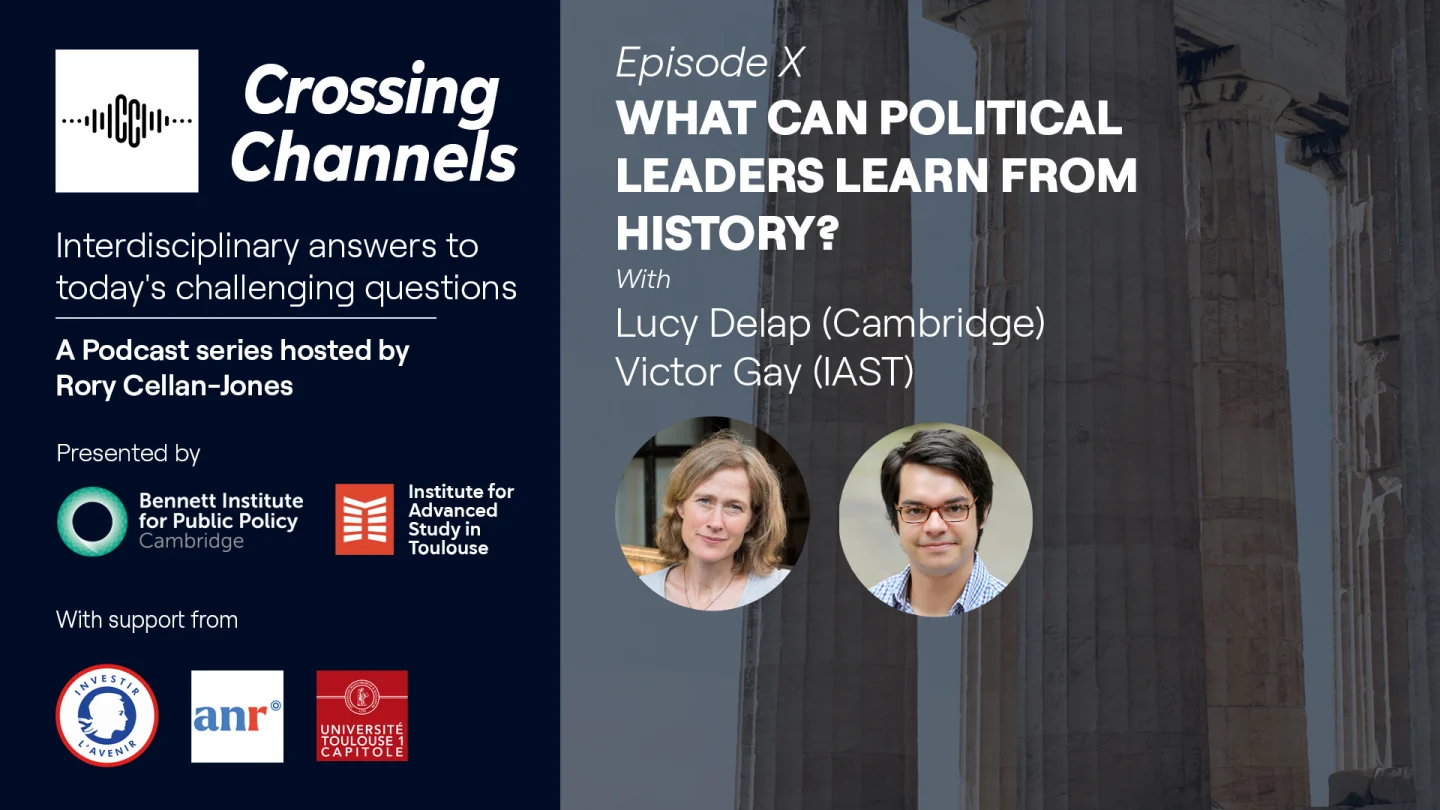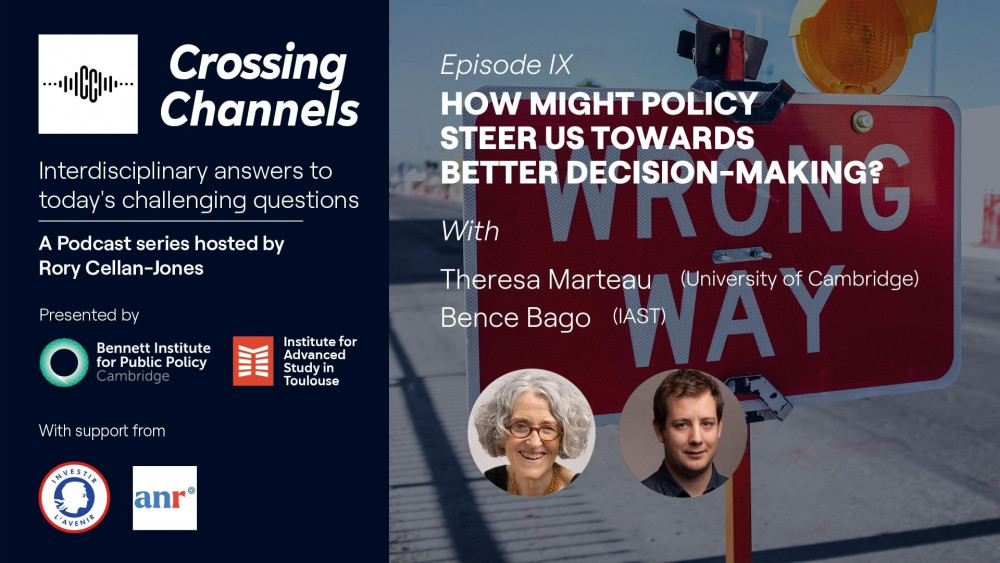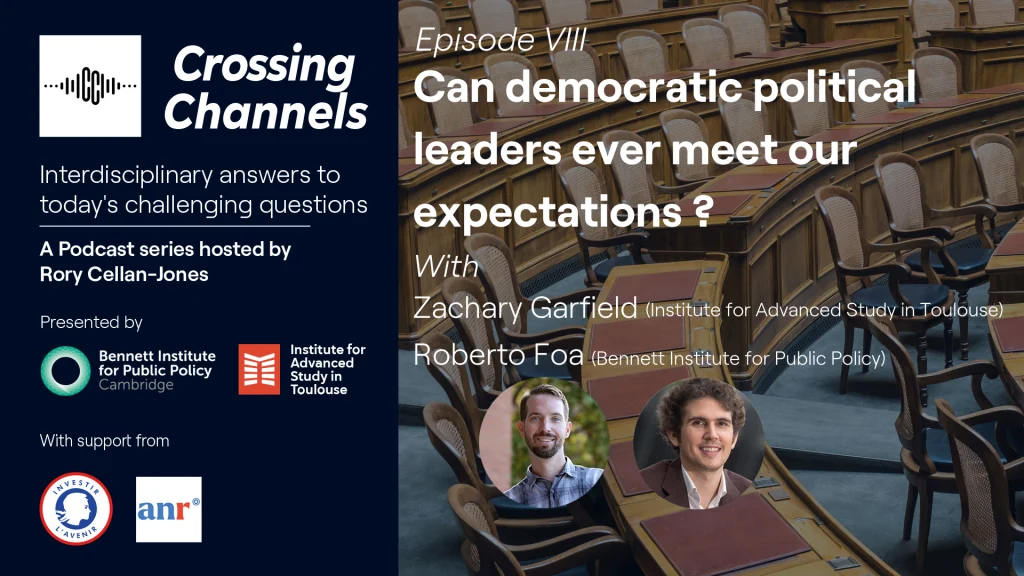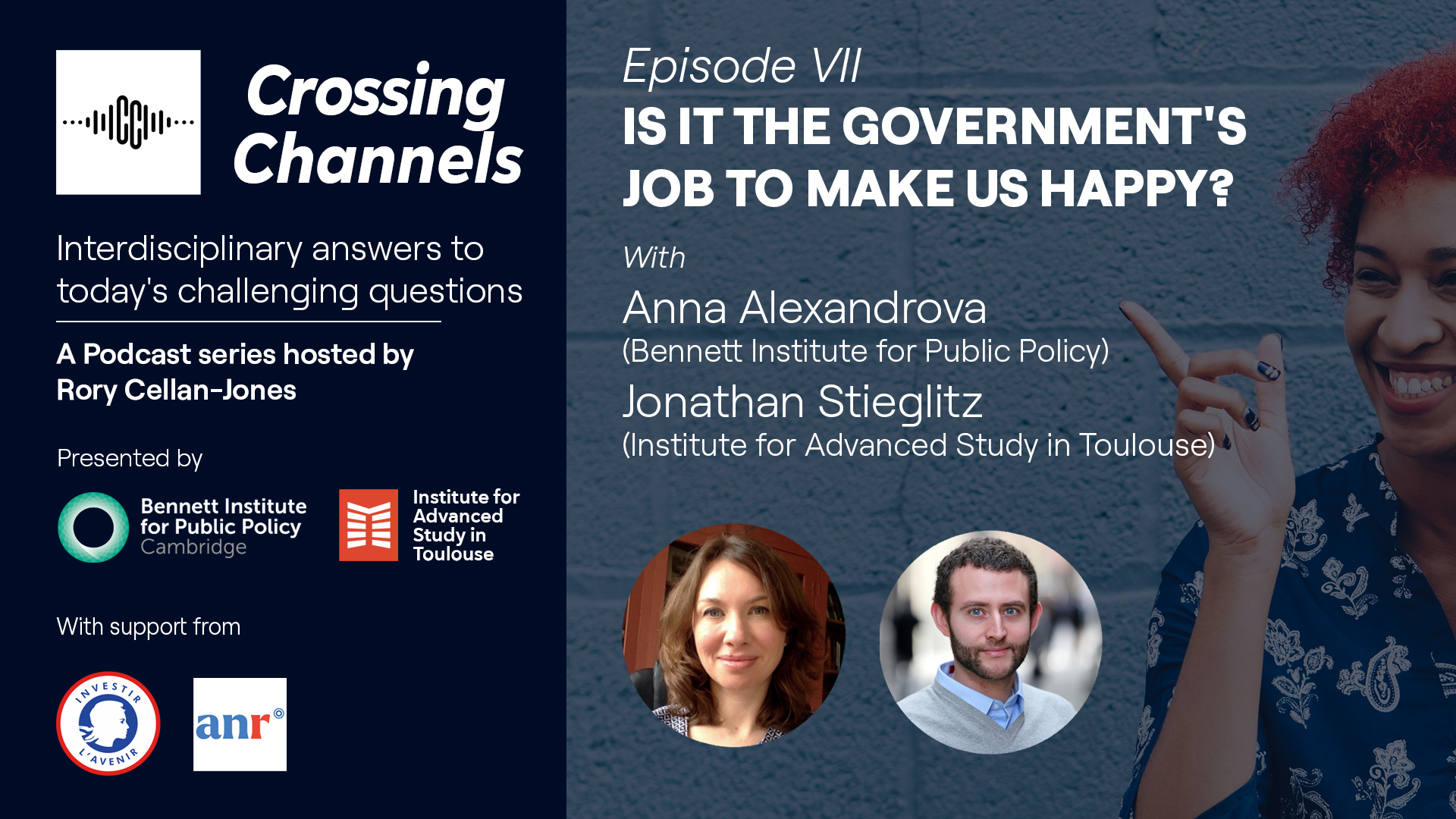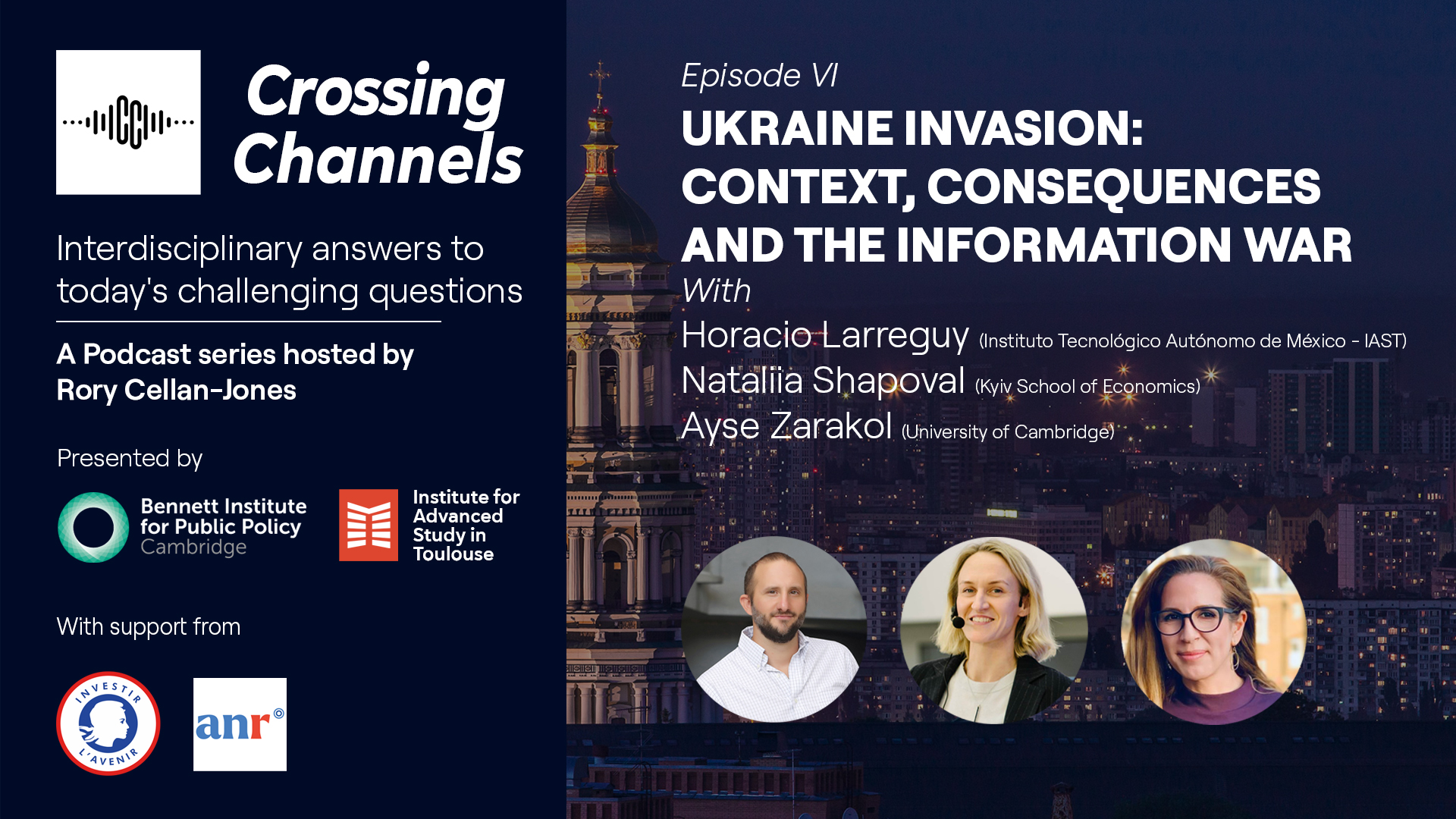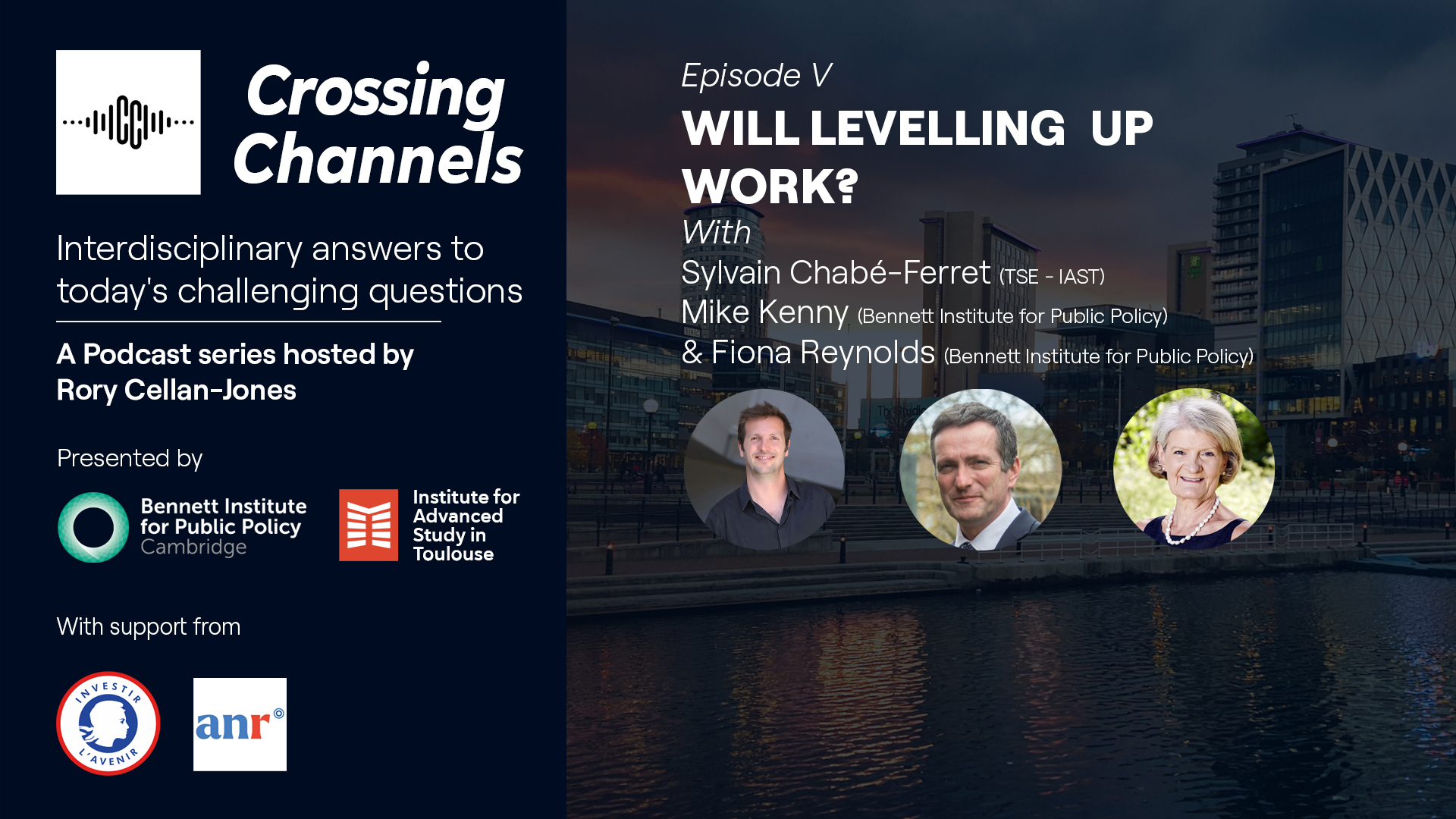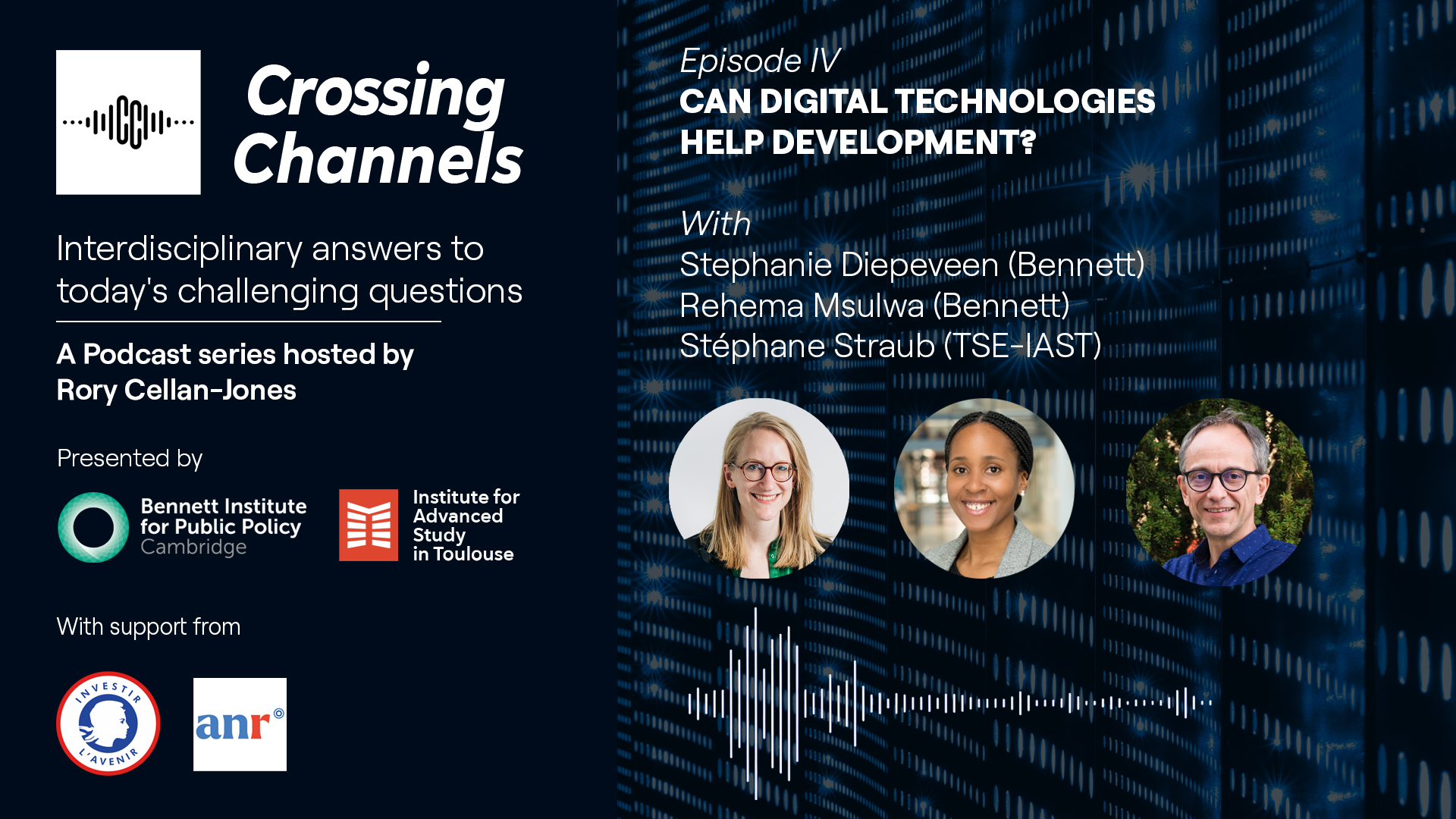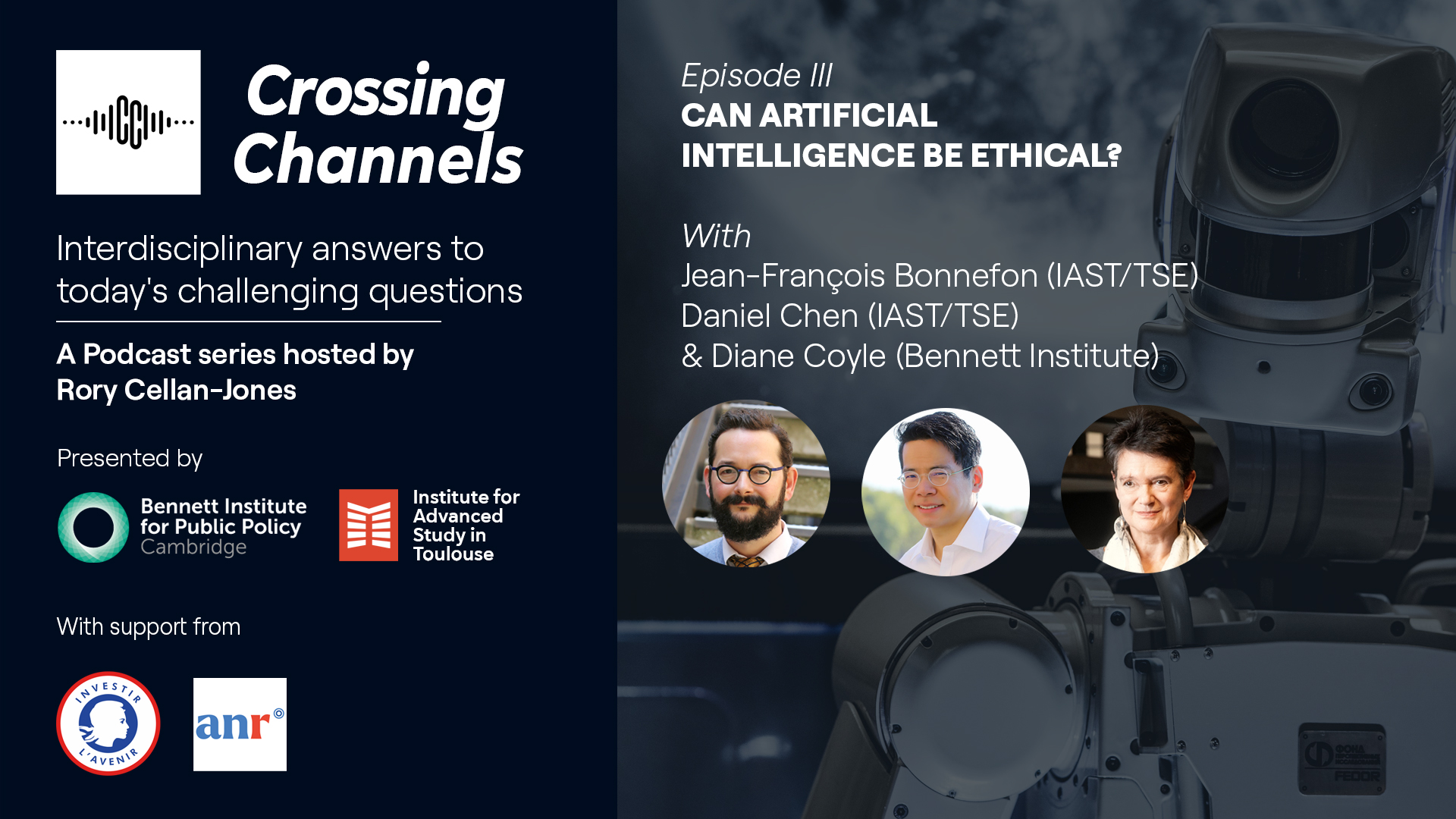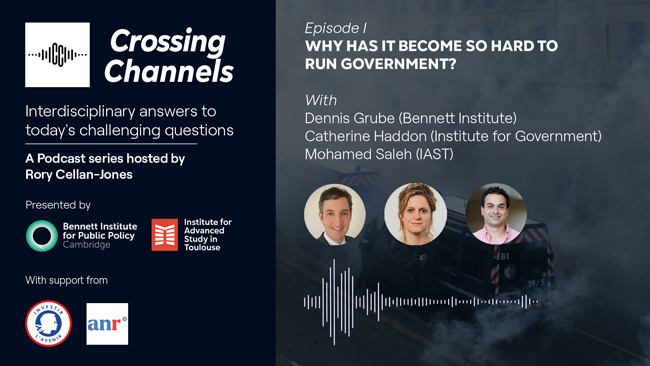Jointly produced by the Bennett School of Public Policy, University of Cambridge, and the Institute for Advanced Study in Toulouse (IAST) this podcast series brings you interdisciplinary perspectives on significant challenges facing society today.
Listen to the series on your preferred platform:
Season five
Episode 4 - Can we make climate policy fair and effective?
Christian Gollier and Alessio Terzi join us to chat about what a “fair” climate transition could look like when the costs are local, the benefits are global, and the politics are hard. They explore why decarbonisation is a whole-economy transformation, what it means for jobs and places, and why the narrative matters as much as the technology. The conversation also looks at carbon pricing and redistribution, the credibility problem of long-term policy, and what kinds of institutions and policies can keep people on board in the years ahead.
Episode 3 - Is intellectual capital the key to future prosperity?
In this episode of Crossing Channels, Richard Westcott talks to Diane Coyle and César Hidalgo about how knowledge, ideas and intangible assets are becoming central to modern prosperity. They discuss what makes intellectual capital distinctive, how AI may widen or narrow inequalities, and why some places benefit more than others. The conversation also explores the challenges of measuring intangible value and what kinds of skills, institutions and infrastructure are needed for countries and regions to turn intellectual capital into broader, long-term growth.
Episode 2 - What really drives inequality?
Richard Westcott (journalist at the BBC) is joined to Jack Newman (Affiliated Researcher at the Bennett School of Public Policy), Angélique Acquatella (Assistant Professor at TSE) and Pinelopi Koujianou Goldberg (Elihu Professor of Economics and Global Affairs and an Affiliate of the Economic Growth Center at Yale University) to explore the forces that shape inequality today.
Drawing on economics, politics and public policy, our guests examine why gaps persist, look at the roles of technology and trade, explore evidence on health inequalities in the UK, and discuss the delivery gap between national ambitions and local capacity. They share examples of when place-based approaches can work, what gets in the way, and how institutions can support more inclusive growth.
Episode 1 - Are universities ready for the age of AI?
In this first episode of series five of Crossing Channels, podcast host Richard Westcott welcomes three experts - Jean-François Bonnefon, François Poinas and Jonathan Grant - to explore how artificial intelligence is transforming higher education.
Season four
Episode 10 - How does migration change our world?
In this final episode of season 4, we are joined by Emmanuelle Auriol (Toulouse School of Economics, IAST) and Catherine Barnard (University of Cambridge), to explore the economic, legal, and social dimensions of migration.
Drawing on insights from law and economics, the conversation explores how migration affects labour markets, legal protections, and social cohesion — from post-Brexit realities in Great Yarmouth, UK, to global questions of fairness and opportunity. The episode examines who migrates and why, the limits of current border regimes, and what more effective and ethical migration policies could look like.
Episode 9 - What is the value of speaking other languages?
In this episode, Richard Westcott is joined by Wendy Ayres-Bennett and Benjamin Pitt to explore a big, everyday question: what is the value of speaking other languages? The conversation looks at how the languages we speak shape our sense of identity, influence how we think and reason, and affect how we relate to others. We explore how multilingualism can foster social cohesion, support cognitive flexibility, and even boost economic opportunities.
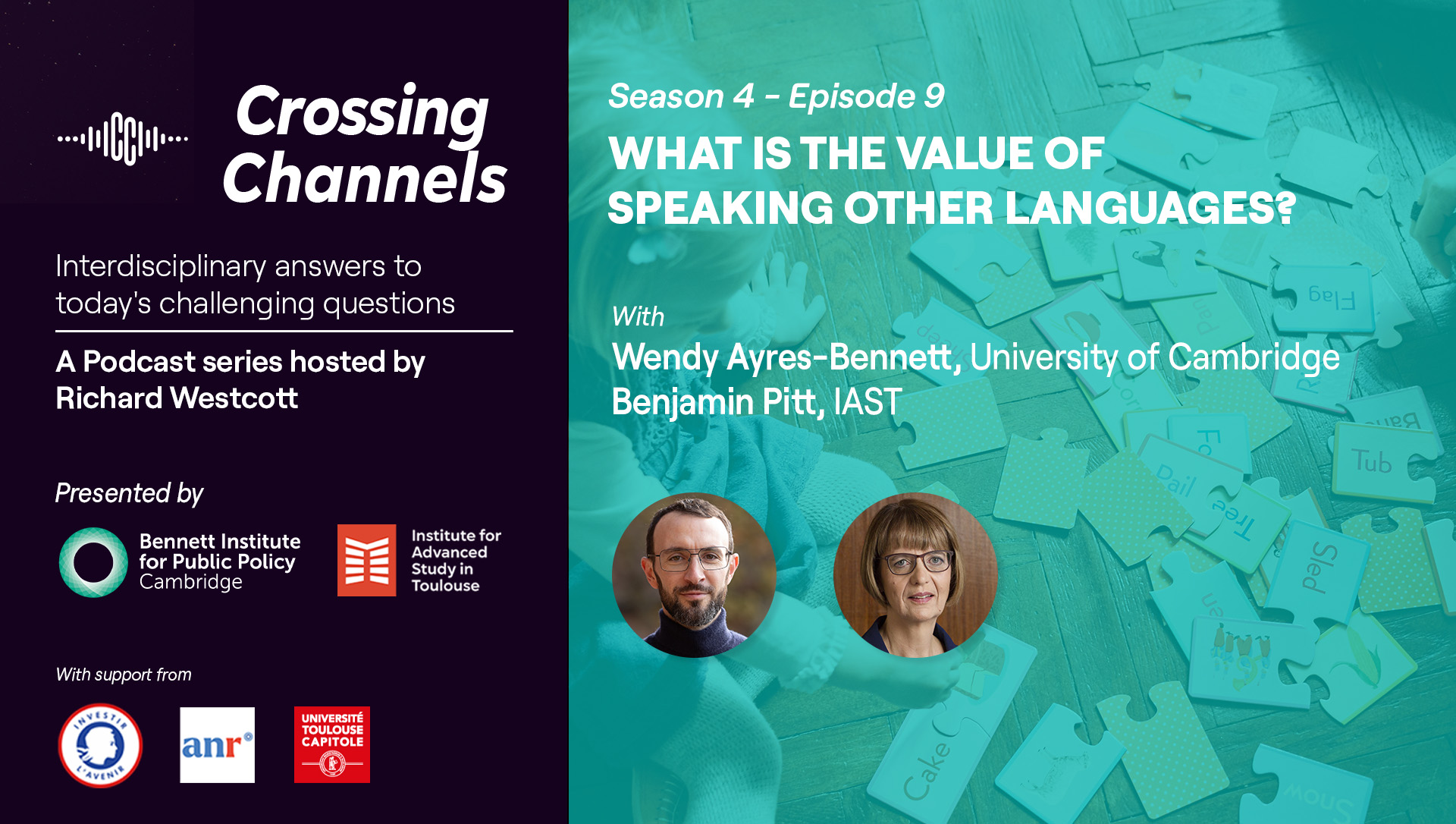
Episode 8 - Why do we choose what we choose?
Richard Westcott is joined by Simone Schnall, Catherine Molho, and Maximilian Müller to explore a big, everyday question: why do we make the choices we do? From decisions about money and morality to careers and relationships, the conversation digs into what really drives us—whether it’s emotions, social pressure, or the stories we tell ourselves after the fact.
Episode 7 - How can we make food that is good for health, societies, the planet and the economy?
Jonathan Stieglitz, IAST and Martin White, University of Cambridge, talk about the global health challenges related to diet and nutrition, the roles of public health policies, cultural practices, and lifestyle changes, while creating sustainable food systems that ensure access to healthy food for all and maintain economic viability.
Episode 6 - Can Europe ever catch up to the US in technology?
Diane Coyle (Bennett Institute), Jacques Crémer (TSE), and Paul Seabright (IAST, TSE) talk about Europe’s position in competing with the US in technology. They explore the factors shaping Europe’s place in the global tech race—how data, policy, investment, competition and culture influence its potential to compete with the US.
Episode 5 - How can green finance drive the clean transition?
Ulrich Hege (TSE), Mathias Reynaert (TSE) and Dimitri Zenghelis (University of Cambridge) join us to explore how green finance can support the clean transition. They discuss the shifting role of financial markets, the balance between public and private investment, and the policies needed to drive long-term change.
Episode 4 - How are data and algorithms impacting our lives?
Hear Richard Westcott (Cambridge University Health Partners and the Cambridge Biomedical Campus) talk to Gina Neff (Cambridge University), Jeni Tennison (Connected by Data), and Jean-François Bonnefon (IAST) about how data and algorithms are shaping our lives. They explore how these technologies impact work, public services, and decision-making, and raise questions about ethics, fairness, and governance.
Episode 3 - Is the world becoming less democratic?
In this episode, Richard Westcott (Cambridge University Health Partners and the Cambridge Biomedical Campus) talks to David Runciman (University of Cambridge), Kristin Michelitch (IAST) and Ahmed Mohamed (IAST) about the decline in democracy indexes worldwide, the cultural, technological, and institutional factors driving these trends, and whether they can be reversed.
Our experts explore the meaning of democracy and the reasons behind the decline of democracy indexes. They examine the impact of technology, media, culture, and religion on reshaping politics and shaping the future of democratic systems.
Episode 2 - What is happening to young people’s mental health?
Richard Westcott talks to Olympia Campbell (IAST), Gordon Harold (University of Cambridge) and Anna Moore (University of Cambridge) about the growing rates of mental health issues among young people. They discuss the key determinants and the most effective ways to support young people's mental health.
To kickstart Season Four of Crossing Channels, our new host, Richard Westcott talks to Alison Liebling (University of Cambridge), Nicola Padfield (University of Cambridge) and Arnaud Philippe (University of Bristol, former IAST fellow) about the growing prison population, the prison experience, and the most effective ways to rehabilitate ex-offenders.
Season three
Episode 10 - Should there be a compulsory retirement age for society's leaders?
To round off season 3, we invite Diane Coyle (Bennett Institute), Ruth Mace (UCL, IAST), and Paul Seabright (IAST) to debate the impact of age on leadership, the consequences of having older leaders for society, and the case for implementing a compulsory retirement age.
Episode 9 - Who pays the price of colonialism today?
In this episode, Rory Cellan-Jones discusses the enduring legacies of colonialism on global economic inequalities, the climate crisis, and the digital space with experts Stephanie Diepeveen (Bennett Institute) and Jordanna Matlon (IAST).
Episode 8 - What’s the point of a protest?
Felix Dwinger and Giacomo Lemoli (IAST) are joined by Lauren Wilcox (University of Cambridge) to discuss why the world is protesting so much, how protesting has changed over time, and what impact protest movements are having on policymaking. Delving into the surge of protests across democratic and autocratic regimes, they examine why people are taking to the streets. They draw on insights from historic protests to explore the factors that contribute to the success of protest movements and progressive social change.
Episode 7 - Can governments regulate AI without stifling innovation?
Rory Cellan-Jones chats with Verity Harding (Bennett Institute for Public Policy), Gina Neff (Minderoo Centre for Technology and Democracy), and Lawrence Rothenberg (IAST and University of Rochester), about artificial intelligence (AI) and the fine balance between innovation and regulation. Together, they explore what makes 'good' regulation and the crucial role of global collaboration in shaping the future of AI.
Episode 6 - Why are women disadvantaged in the workplace?
Emmanuelle Auriol (IAST), Nina Jörden (Bennett Institute) and Francesca Barigozzi (University of Bologna) debate the underrepresentation of women in certain sectors, the persistence of the motherhood wage gap, and the impact of flexible work on women’s careers.
Episode 5 - Can economic growth and sustainability coexist?
Matthew Agarwala, Stefan Lamp and Alessio Terzi join Rory Cellan-Jones about the trade-off between economic growth and environmental protection, the policies and legislations needed to achieve green growth, and the challenges associated with implementing such measures.
Episode 4 - How can universal basic infrastructure support growth?
Rory Cellan-Jones talks to Jean-Paul Azam (IAST), Diane Coyle and Andy Westwood (Bennett Institute) about the potential of universal basic income to tackle regional inequalities, boost economic growth in ‘left behind’ and growing places, and rebuilding democracy.
Episode 3 - Can technology rescue ailing health services?
Angelique Acquatella (TSE), Shan Morgan (Bennett Institute) and Jennifer Dixon (Health Foundation) discuss the current state of digital technologies in the UK and the US, the challenges of adopting digital technologies, and the opportunities for med tech for individuals and the wider economy.
Episode 2 - The world’s problems are interdisciplinary – why is academic research so siloed?
Ingela Alger (IAST) and Flavio Toxvaerd (University of Cambridge) talk to Rory Cellan-Jones about the challenges faced in conducting interdisciplinary research.
They emphasize the significant benefits that interdisciplinarity can bring and share insight into how to foster an interdisciplinary research culture for better results.
If you enjoyed this podcast then check out:
- Crossing Channels S2E5 featuring Sarah Dillon and Manvir Singh “Why are stories important for society?”
- Alger, I., Weibull, J. W., & Lehmann, L. (2020). Evolution of preferences in structured populations: genes, guns, and culture. Journal of Economic Theory, 185, 104951.
- Alger, I. (2023). Evolutionarily stable preferences. Philosophical Transactions of the Royal Society B, 378(1876), 20210505.
- Alger, I., Dridi, S., Stieglitz, J., & Wilson, M. L. (2023). The evolution of early hominin food production and sharing. Proceedings of the National Academy of Sciences, 120(25), e2218096120.
- Toxvaerd, F., & Rowthorn, R. (2022). On the management of population immunity. Journal of Economic Theory, 204, 105501.
- Toxvaerd, F. (2020). Herd immunity – crucial yet irrelevant. Bennett Institute for Public Policy, University of Cambridge.
- Bromham, L., Dinnage, R., & Hua, X. (2016). Interdisciplinary research has consistently lower funding success. Nature, 534(7609), 684-687.
Episode 1 - How big a problem is short-termism in government?
Anne Degrave (IAST), Dennis Grube (Bennett Institute) and Halima Khan (Bennett Institute).
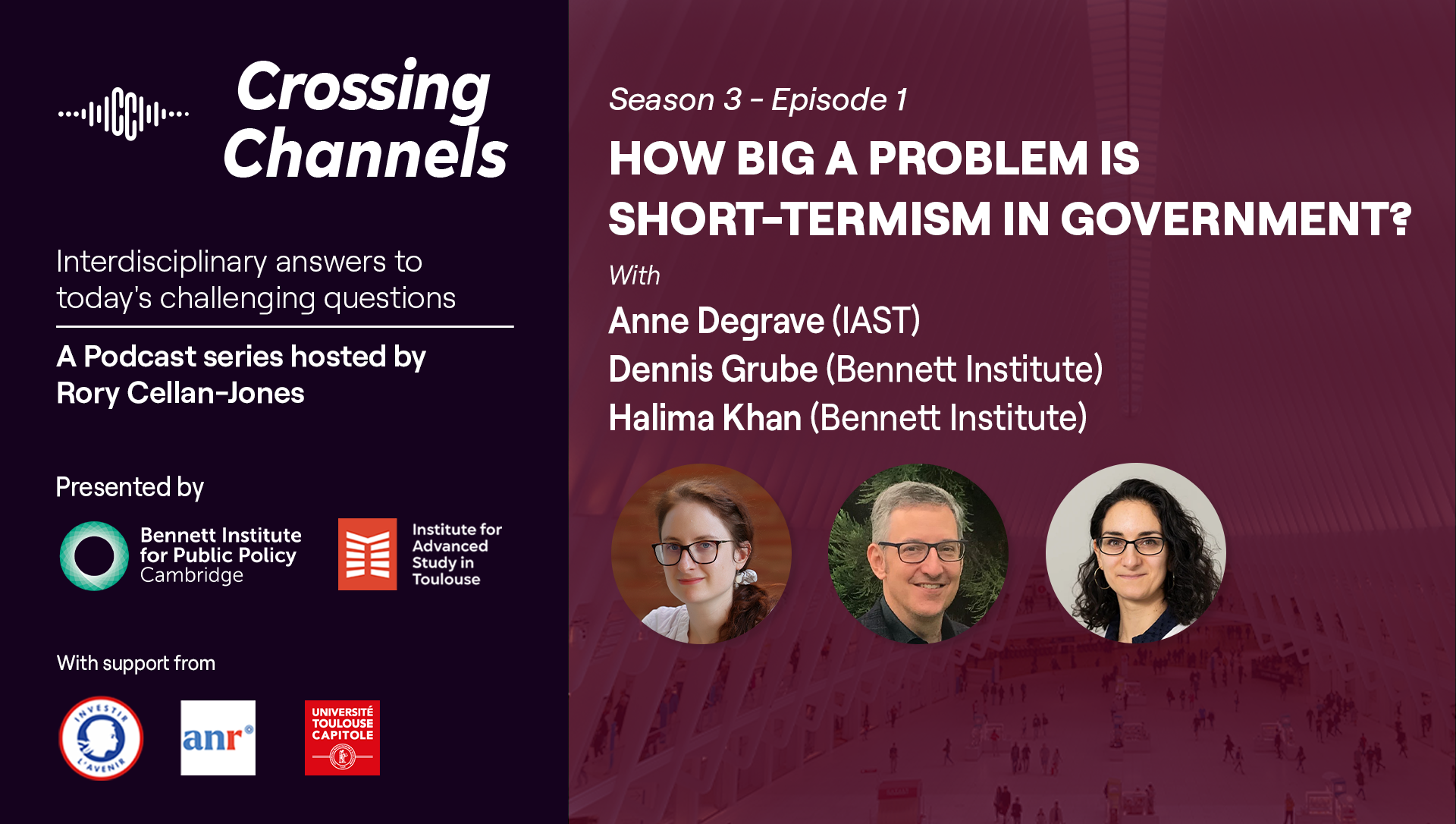
Season two
Episode 10 - What is the future of religion?
Iza Hussin (University of Cambridge) and Paul Seabright (IAST).
Episode 9 - Are countries becoming harder to govern?
Louis Baktash (Bennett Institute), Mathieu Carpentier (Toulouse Capitole University, IAST) and Michael Kenny (Bennett Institute).
Episode 8 - Are emerging technologies more hype than reality?
Sam Gilbert (Bennett Institute), César Hidalgo (IAST, TSE, University of Toulouse) and Jeni Tennison (Bennett Institute).
Episode 7 - Should children have the right to vote?
David Runciman (University of Cambridge) and Karine Van der Straeten (IAST).
Episode 6 - Is technology changing our behaviour?
Maria Kleshnina (IAST), Daniel Nettle (L'École normale supérieure - PSL) and Amy Orben (University of Cambridge).
Episode 5 - Why are stories important for society?
With Sarah Dillon (University of Cambridge) and Manvir Singh (IAST).
Episode 4 - Ukraine war - how can academics apply their expertise?
With Tymofiy Mylovanov and Nataliia Shapoval (Kyiv School of Economics).
Episode 3 - How much do people care about inequality?
With Charlotte Cavaillé (Ford School of Public Policy, University of Michigan and IAST), Ailbhe McNabola (Bennett Institute for Public Policy - Power to Change) and Jack Shaw (Bennett Institute for Public Policy).
Episode 2 - Wellbeing at work: whose job is it to fix it?
With Gordon Harold (University of Cambridge), Laura Nurski (Bruegel) and Zoe Purcell (IAST).
Episode 1 - Has digital technology made us better off?
With Diane Coyle (Bennett Institute - Cambridge), Jacques Crémer and Jean Tirole (IAST-TSE).
Season one
Episode 10 - What can political leaders learn from history?
With Lucy Delap, historian at Cambridge and Victor Gay, IAST and TSE economist specialized in history
Episode 9 - How might policy steer us towards better decision-making?
With Theresa Marteau, a health psychologist Professor and Dr Bence Bago (IAST)
Episode 8 - Can democratic political leaders ever meet our expectations?
With Roberto Foa, Assistant Professor in Politics and Public Policy at the University of Cambridge, and Dr Zachary Garfield (IAST)
Episode 7 - Is it the government's job to make us happy?
With Anna Alexandrova (Bennett Institute) and Jon Stieglitz (IAST)
Episode 6 - Special Episode - Ukraine invasion: context, consequences and the information war
With Horacio Larreguy (IAST - ITAM), Nataliia Shapoval (Kyiv School of Economics) and Ayse Zarakol (Cambridge University)
Episode 5 - Will Levelling Up Work
With Sylvain Chabé-Ferret (IAST-TSE), Michael Kenny (Bennett Institute) and Fiona Reynolds (Bennett Institute)
With Stephanie Diepeveen (Bennett Institute), Rehema Msulwa (Bennett Institute) and Stéphane Straub (TSE - IAST)
Episode 3 - Can artificial intelligence be ethical?
with Jean-François Bonnefon (IAST - TSE - CNRS), Daniel Chen (TSE - IAST), and Diane Coyle (Bennett Institute - Cambridge)
Episode 2 - What does it mean to bring nature into the economy?
with Matthew Agarwala (Bennett), Cristina Penasco (Cambridge), and Nicolas Treich (TSE-IAST-INRAe)
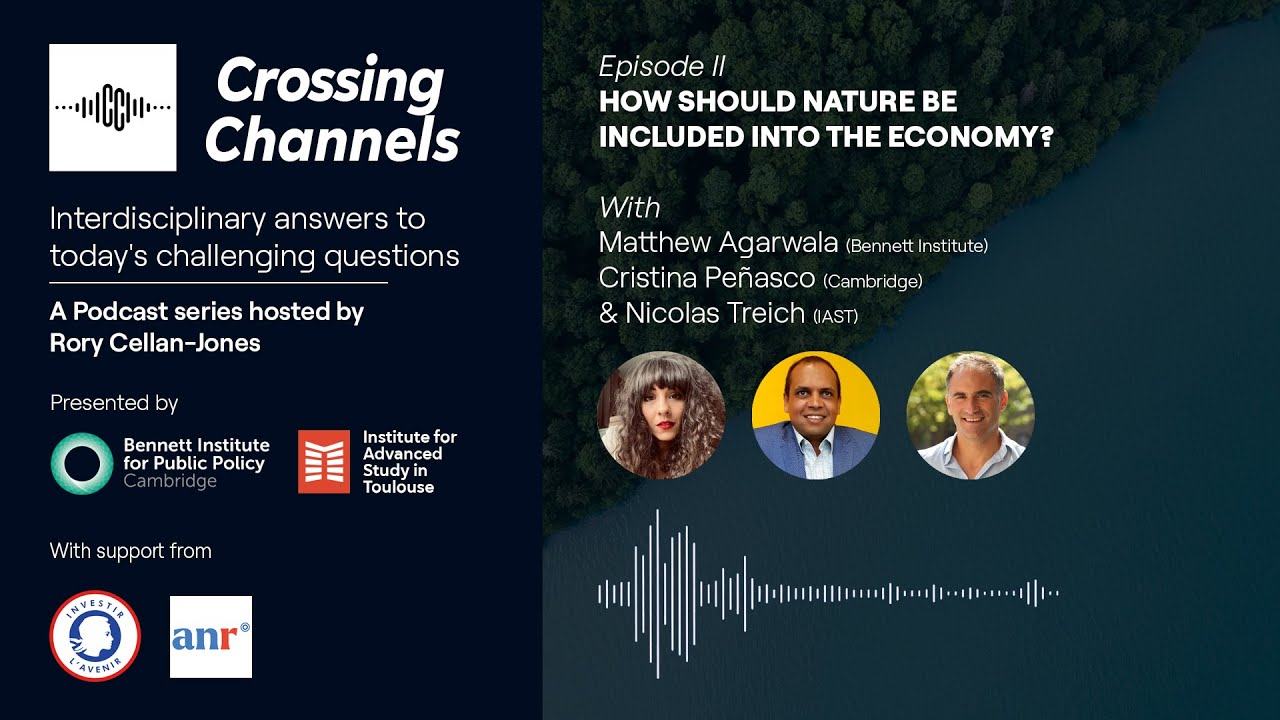
Episode 1 - Why has it become so hard to run government?
with Dennis Grube, Catherine Haddon and Mohamed Saleh
Episode 0 - Launching Crossing Channels with Diane Coyle and Paul Seabright





